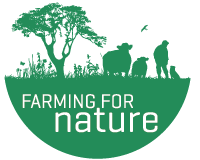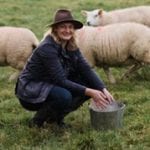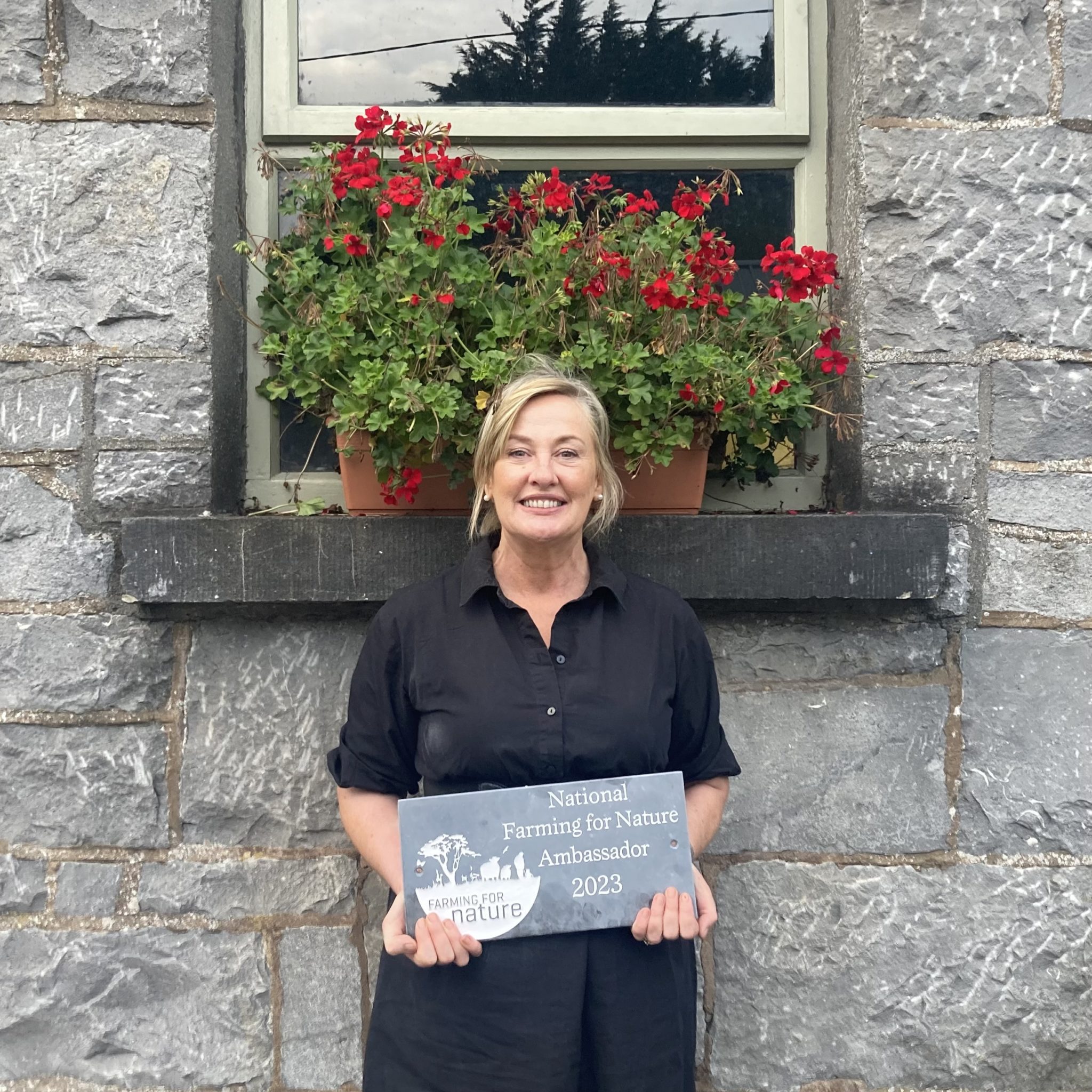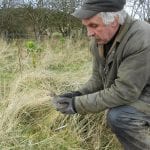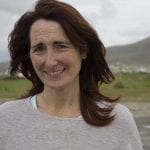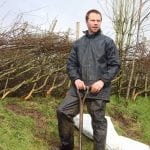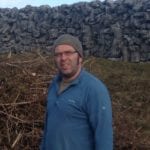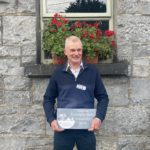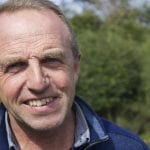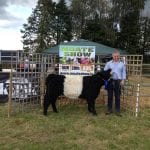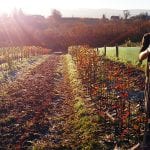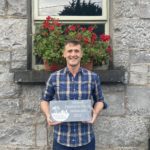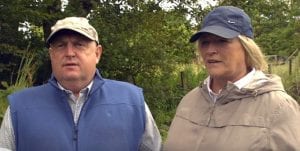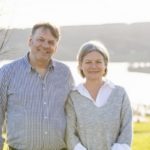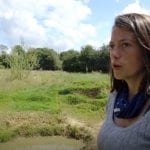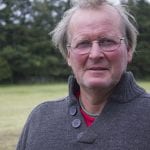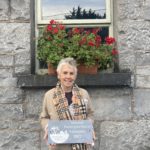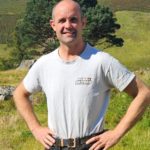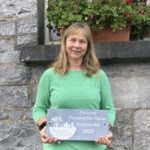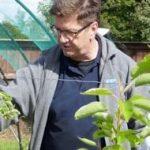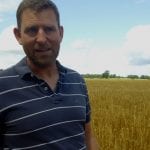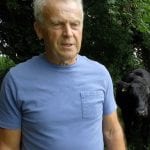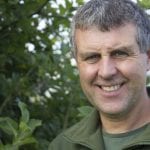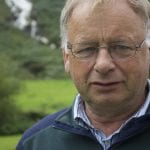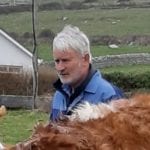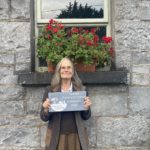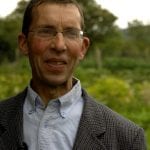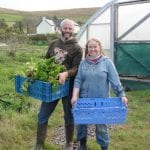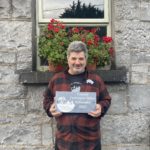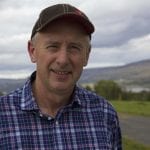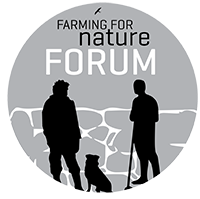Since 2018 Farming For Nature have been building up a network of exemplary farmers across all the land types and farming systems. Here are the current Farming For Nature Ambassadors.
Ailbhe Gerrard (Co.Tipperary)
Ailbhe runs a 30 hectare farm on the banks of Lough Derg. She bought the land in 2010 and took on the challenge of turning a neglected farm into a diverse farm system to make a living. Today one third of the farm is broadleaf (3 acres of which is designated), one third is arable and one third is agri-environment under wild bird cover. She has an organic sheep flock and honey bees which she sells both directly from the farm and online. Ailbhe shares her passion of farming with others with regular open days and demonstration days, and her farm is an official Teagasc demo farm. She is a Nuffield Agricultural Scholar and lectures at Gurteen Agricultural College. More information about the farm and a short podcast with Ailbhe are available here. Ambassador since 2019
Andrew Bergin (Co.Kildare)
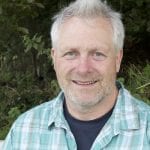 Andrew Bergin farms 320 acres of tillage. He has been practicing no-till cereals for a good number of years, while managing the soil in a way to promote high levels of biological benefits. Andrew sows cover crops, and is constantly trailing on farm what species work best for his soil and rotation. This is an integral part that has allowed Andrew prosper in this system that benefit both the environment and the farmer. His approach is to improve the soil structure and the microflora and insect populations in the soil. Crops include spring and winter cereals, oil seed rape and peas. Integrated crop management is practiced to minimise the use of sprays – no insecticides have been used in the last 5 years. Pollinator strips, 6 – 10 meters wide are in place around most of the tillage fields margins, attracting large numbers of insects and birds. In addition, a number of fields margins and other areas, which were difficult to cultivate for tillage crops, have been planted with trees – oak, beech, birch, holly, hazel, pheasant berry etc. Andrew’s farm is moving away from excessive inputs and looking bring new ideas and knowledge as well as a positive focus to a type of farming generally considered less environmentally friendly. “It is important to get involved in and look at local research so we can each discover what is best for our own soils, not what chemical is best to throw on it.” More information and a short film on Andrew’s farm here. Ambassador since 2020
Andrew Bergin farms 320 acres of tillage. He has been practicing no-till cereals for a good number of years, while managing the soil in a way to promote high levels of biological benefits. Andrew sows cover crops, and is constantly trailing on farm what species work best for his soil and rotation. This is an integral part that has allowed Andrew prosper in this system that benefit both the environment and the farmer. His approach is to improve the soil structure and the microflora and insect populations in the soil. Crops include spring and winter cereals, oil seed rape and peas. Integrated crop management is practiced to minimise the use of sprays – no insecticides have been used in the last 5 years. Pollinator strips, 6 – 10 meters wide are in place around most of the tillage fields margins, attracting large numbers of insects and birds. In addition, a number of fields margins and other areas, which were difficult to cultivate for tillage crops, have been planted with trees – oak, beech, birch, holly, hazel, pheasant berry etc. Andrew’s farm is moving away from excessive inputs and looking bring new ideas and knowledge as well as a positive focus to a type of farming generally considered less environmentally friendly. “It is important to get involved in and look at local research so we can each discover what is best for our own soils, not what chemical is best to throw on it.” More information and a short film on Andrew’s farm here. Ambassador since 2020
Andrew Chilton (Co.Roscommon)
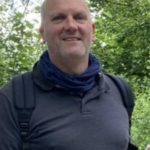 Andrew Chilton manages 2 farms in Co Roscommon alongside his family. The first farm is 6 ha of marginal land and is certified organic. An advocate for diversity on farms, there is a mix of animals kept on this farm including a small herd of Dexters and at different times there are pigs, goats, sheep and chickens. They grow vegetables for the home and there is an apple and plum orchard on the farm as well. Andrew has trialled different methods of agroforestry on this land including planting field corners and nature corridors, and block planting. He plants between 50-100 trees on the land every year. Andrew has dug 2 ponds on the land which has attracted many insects and birds to the land – “There is tremendous birdlife on the land, we have counted over 30 different bird species on the farm.” The second farm borders Lough Key and is surrounded by woodland. A herd of 52 alpacas are kept on this farm and Andrew produces alpaca fleece which is processed in the UK and the finished pillow and duvet products are sold directly from the farm. They also run farm tours and alpaca trekking. All of the animals are on a rotational grazing system and overwinter outdoors. Andrew has been increasing the diversity of grass species in the pasture in recent years. There is also an apiary on the farm and honey is sold commercially. Andrew works with Social Farming Ireland and teaches the NOTS Organic Production Principles Course. He is also a farm advisor/planner. More information on Andrew’s farm here. Ambassador since 2022
Andrew Chilton manages 2 farms in Co Roscommon alongside his family. The first farm is 6 ha of marginal land and is certified organic. An advocate for diversity on farms, there is a mix of animals kept on this farm including a small herd of Dexters and at different times there are pigs, goats, sheep and chickens. They grow vegetables for the home and there is an apple and plum orchard on the farm as well. Andrew has trialled different methods of agroforestry on this land including planting field corners and nature corridors, and block planting. He plants between 50-100 trees on the land every year. Andrew has dug 2 ponds on the land which has attracted many insects and birds to the land – “There is tremendous birdlife on the land, we have counted over 30 different bird species on the farm.” The second farm borders Lough Key and is surrounded by woodland. A herd of 52 alpacas are kept on this farm and Andrew produces alpaca fleece which is processed in the UK and the finished pillow and duvet products are sold directly from the farm. They also run farm tours and alpaca trekking. All of the animals are on a rotational grazing system and overwinter outdoors. Andrew has been increasing the diversity of grass species in the pasture in recent years. There is also an apiary on the farm and honey is sold commercially. Andrew works with Social Farming Ireland and teaches the NOTS Organic Production Principles Course. He is also a farm advisor/planner. More information on Andrew’s farm here. Ambassador since 2022
Anthony Mooney (Co.Kildare)
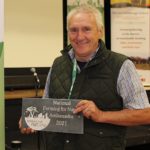 Anthony Mooney runs a 200-acre beef farm with the help of his wife Mary Rose and son Conor. The fertile limestone soil is well suited for growing high quality grass. Anthony runs a herd of between 70-100 cross-bred continental cattle. The grassland has not been reseeded in over 25 years – the permanent pasture contains a diverse range of grasses and flowering plants. Very few external inputs are used on the farm – chemical fertilizer hasn’t been used on the land in over 20 years and very little concentrate meal is fed to the animals. The multi-species hay meadows go to flower in the summer months, providing crucial habitats and food sources for various creatures. A wildlife enthusiast for much of his life, Anthony has spent years observing and recording different plant, bird and insect species on the land; “Over the past 2 years I have started targeting specific species on the farm that I thought needed help – birds, mammals, insects and plants. For example, we’ve been focusing on ground nesting birds like skylarks and meadow pipits – I delayed the mowing of a field last summer because there was a nesting skylark in one of the meadows.” There are 2 ponds on the land which create important water habitats for frogs, birds and insects. Trees and hedgerows are also important habitats on the farm – “I’ve put in around 600-700 meters of hedges on the farm. I’ve never taken out a hedge. I manage hedges for biodiversity. They are cut back every 4-5 years to encourage new growth.” More information and a short film on Anthony’s farm here. Ambassador since 2021
Anthony Mooney runs a 200-acre beef farm with the help of his wife Mary Rose and son Conor. The fertile limestone soil is well suited for growing high quality grass. Anthony runs a herd of between 70-100 cross-bred continental cattle. The grassland has not been reseeded in over 25 years – the permanent pasture contains a diverse range of grasses and flowering plants. Very few external inputs are used on the farm – chemical fertilizer hasn’t been used on the land in over 20 years and very little concentrate meal is fed to the animals. The multi-species hay meadows go to flower in the summer months, providing crucial habitats and food sources for various creatures. A wildlife enthusiast for much of his life, Anthony has spent years observing and recording different plant, bird and insect species on the land; “Over the past 2 years I have started targeting specific species on the farm that I thought needed help – birds, mammals, insects and plants. For example, we’ve been focusing on ground nesting birds like skylarks and meadow pipits – I delayed the mowing of a field last summer because there was a nesting skylark in one of the meadows.” There are 2 ponds on the land which create important water habitats for frogs, birds and insects. Trees and hedgerows are also important habitats on the farm – “I’ve put in around 600-700 meters of hedges on the farm. I’ve never taken out a hedge. I manage hedges for biodiversity. They are cut back every 4-5 years to encourage new growth.” More information and a short film on Anthony’s farm here. Ambassador since 2021
Aonghus Ó Coistealbha (Co.Galway)
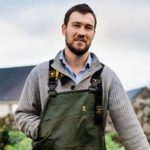 Aonghus Ó Coistealbha is a market gardener from Connemara Co. Galway. An Garraí Glas is a 1-acre farm where Aonghus grows a variety of chemical-free vegetables including lettuce/salad leaves, onions, tomatoes, radishes, herbs and more. A tremendous amount of vegetables are grown from a small space, not to mention a challenging landscape with plenty of stone and a strong Atlantic prevailing wind. All of the fresh produce grown is sold to local shops and restaurants, as well as in the on-farm shop. Aonghus is particularly interested in regenerative farming; composting, soil health and building fertility is of utmost importance to this farming system. Compost is made on the farm using food waste from local café’s and restaurants, seaweed and other organic material from the land. Aonghus is passionate about his local Gaeltacht community and has worked hard to educate the local community in terms of where their food comes from and how it is grown. His mission is to produce high quality, fresh and nutritious veg for the local community. He is open and willing to share his farming advice and story with anyone who would like to learn, and he takes a number of interns and volunteers on the farm every year. More information on Aonghus’s farm here. Ambassador since 2022
Aonghus Ó Coistealbha is a market gardener from Connemara Co. Galway. An Garraí Glas is a 1-acre farm where Aonghus grows a variety of chemical-free vegetables including lettuce/salad leaves, onions, tomatoes, radishes, herbs and more. A tremendous amount of vegetables are grown from a small space, not to mention a challenging landscape with plenty of stone and a strong Atlantic prevailing wind. All of the fresh produce grown is sold to local shops and restaurants, as well as in the on-farm shop. Aonghus is particularly interested in regenerative farming; composting, soil health and building fertility is of utmost importance to this farming system. Compost is made on the farm using food waste from local café’s and restaurants, seaweed and other organic material from the land. Aonghus is passionate about his local Gaeltacht community and has worked hard to educate the local community in terms of where their food comes from and how it is grown. His mission is to produce high quality, fresh and nutritious veg for the local community. He is open and willing to share his farming advice and story with anyone who would like to learn, and he takes a number of interns and volunteers on the farm every year. More information on Aonghus’s farm here. Ambassador since 2022
Blátnaid Gallagher (Co. Galway)
Blátnaid Gallagher and her husband Niall manage a diverse farm with a range of different habitats such as woodland, permanent pasture, bogland and rewilded land. Blátnaid runs a small flock of pedigree Galway ewes, producing organic lamb and Galway wool. The farm is very extensively managed, with no chemicals used and external inputs are extremely low. Geese, ponies and donkeys are also kept on the farm. Much of the land is left for biodiversity and wildlife, including 6ha of bogland which is now a dedicated butterfly sanctuary, providing a habitat for the rare Marsh Fritillary butterfly as well as numerous other insects and birds. Mature hedgerows, woodland and nature corridors throughout the land provide habitat for the healthy populations of birds on the farm, as well as badgers, hares, pine marten and foxes. More information on Blátnaid’s farm here. Ambassador since 2023.
Boyd Bryce (Co.Donegal)
Boyd and his wife Bride run a 350-acre farm on Inch Island, Co. Donegal. The farm is a mix of arable areas, sheep pastures and woodland, all of which is managed sensitively for nature. Boyd farms his land for nature and manages all aspects of the farm with nature in mind, including his shorelines, wetlands, woodlands, field boundaries and non-farmed areas. He is a good example of someone who has spent a lifetime improving his farm for nature. “Leave your hedges… a hedge without berries or blossom isn’t a hedge but a bundle of sticks” More information and a short film on Boyd’s farm here. Ambassador since 2019
Bridget Murphy (Co.Sligo)
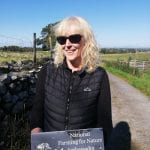 Bridget has been living on and farming mountain land for nearly 20 years. She would be the 8th generation she knows farming the land. She prefers to practice agroecology over agriculture or agribusiness and uses her farm as a case study on issues ranging from governance of the commons, to using native ponies and bees to diversify grazing / forage regimes on the hills. She keeps a flock of Cheviot sheep, four hill ponies and an apiary of native black bees, plants in copses of native woodlands and maintains watercourses and streams. She builds dry stone walls and keeps a few acres under traditional hay meadow. Her land has a healthy wildlife population that includes pine marten, badgers, foxes and lots of hares. The birdlife is prolific and there are small trout in the streams. Heath and blanket bog characterise the higher land parcels, and for the last decade she has been working on rewetting sections of the land; she sees the value in the allowing the natural habitat to return and recognises the need to keep the carbon stores locked in the ground. She is a long time land rights activist from her early days fighting the Apartheid system in South Africa and claiming land back for rural black communities, she is also a long time ecofeminist. More information and a podcast on Bridget’s farm here. Ambassador since 2020
Bridget has been living on and farming mountain land for nearly 20 years. She would be the 8th generation she knows farming the land. She prefers to practice agroecology over agriculture or agribusiness and uses her farm as a case study on issues ranging from governance of the commons, to using native ponies and bees to diversify grazing / forage regimes on the hills. She keeps a flock of Cheviot sheep, four hill ponies and an apiary of native black bees, plants in copses of native woodlands and maintains watercourses and streams. She builds dry stone walls and keeps a few acres under traditional hay meadow. Her land has a healthy wildlife population that includes pine marten, badgers, foxes and lots of hares. The birdlife is prolific and there are small trout in the streams. Heath and blanket bog characterise the higher land parcels, and for the last decade she has been working on rewetting sections of the land; she sees the value in the allowing the natural habitat to return and recognises the need to keep the carbon stores locked in the ground. She is a long time land rights activist from her early days fighting the Apartheid system in South Africa and claiming land back for rural black communities, she is also a long time ecofeminist. More information and a podcast on Bridget’s farm here. Ambassador since 2020
Brigid O’ Connor (Co.Kerry)
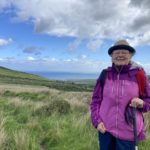 Brigid O’Connor is a lifelong farmer from Camp County Kerry where she runs an organic sheep farming system. Brigid breeds 120 scotch ewes on 54 hectares. The farm is made up of 3 different land types – permanent pasture, heath and commonage. The farm is very extensively managed with minimal external inputs. The family have farmed the land for generations and Brigid is proud to carry on traditional methods of farming handed down to her from her parents and grandparents – “Growing up on a farm, you learn from your parents and your grandparents. I remember my grandfather teaching me things about sheep and it is knowledge that I still use today”. Brigid acknowledges and respects the high nature value of the land she farms, and its importance from a wildlife and biodiversity perspective. The land has never been reseeded and is managed is the most natural and low-impact manner possible. The bog contains a wonderful array of wildflowers including the rare Kerry Violet. There is a healthy population of pheasant nesting on the farm and the Hen Harrier is frequently seen overhead. Brigid diversified by the farm by running farm tours where she explains the history of the land and the importance of the farmland habitats. Brigid has a deep love for the land she cares for and sees herself as a custodian of the land. More information on Brigid’s farm and view a short film here. Ambassador since 2022
Brigid O’Connor is a lifelong farmer from Camp County Kerry where she runs an organic sheep farming system. Brigid breeds 120 scotch ewes on 54 hectares. The farm is made up of 3 different land types – permanent pasture, heath and commonage. The farm is very extensively managed with minimal external inputs. The family have farmed the land for generations and Brigid is proud to carry on traditional methods of farming handed down to her from her parents and grandparents – “Growing up on a farm, you learn from your parents and your grandparents. I remember my grandfather teaching me things about sheep and it is knowledge that I still use today”. Brigid acknowledges and respects the high nature value of the land she farms, and its importance from a wildlife and biodiversity perspective. The land has never been reseeded and is managed is the most natural and low-impact manner possible. The bog contains a wonderful array of wildflowers including the rare Kerry Violet. There is a healthy population of pheasant nesting on the farm and the Hen Harrier is frequently seen overhead. Brigid diversified by the farm by running farm tours where she explains the history of the land and the importance of the farmland habitats. Brigid has a deep love for the land she cares for and sees herself as a custodian of the land. More information on Brigid’s farm and view a short film here. Ambassador since 2022
Bruce Thompson (Co. Laois)
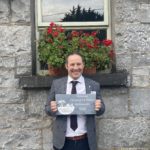
Bruce Thompson runs dairy farm in Ballyfin County Laois. He is an 8th generation farmer. The farm which was traditionally a mixed farm is now a commercial dairy farm with a herd of 320 cows. Bruce operates a grass based, high efficiency production system. In 2020, Bruce started a Nuffield Scholarship and from this he developed a passion for dung beetles. On his own farm he has a particular interest in reducing animal remedies through prevention, with a focus on animal wormers. He has made dramatic reductions in his wormer usage by making use of his farm microscope for diagnosis and pioneering new grazing strategies. Other actions taken for nature on his farm include managing hedgerows for biodiversity, planting new hedgerows and incorporating multi-species swards into his grassland to help reduce inputs. More information on Bruce’s farm here. Ambassador since 2023.
Cathal and Bronagh O’Rourke (Co.Clare)
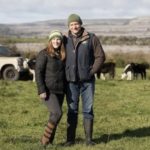 Cathal and Bronagh O’Rourke along with their three daughters manage a 500-acre farm in the Burren County Clare. The cattle finishing farming system is complimented by a successful on-site agri-tourism business. The farm is a mix of green land, mature hazel woodland, limestone pavement, turlough and species rich grassland. Part of the farm is within the Burren National Park and Lough Bunny is situated on the land. The O’Rourke family are part of the Burren Farming Programme where they take numerous actions to support nature and wildlife on the land. These include clearing scrubland to link up grazable areas, grazing cattle on the Winterage to encourage the growth of native Burren flora and reducing inputs in the improved agricultural areas of the farm. Some of their beef produce is sold direct to customers which has proven to be a successful alternative route to market option. They are part of the Hares Corer Project which involves the planting of native Burren Pine on the land. Cathal and Bronagh are passionate about educating people on the natural beauty, the flora and fauna, and the local heritage of the Burren region. There is an abundance of birds on the land including the occasional Hen Harrier. They describe their way of farming as a lifestyle which respects and enhances the land of which they are custodians of. More information on Cathal and Bronagh’s farm here. Ambassadors since 2022
Cathal and Bronagh O’Rourke along with their three daughters manage a 500-acre farm in the Burren County Clare. The cattle finishing farming system is complimented by a successful on-site agri-tourism business. The farm is a mix of green land, mature hazel woodland, limestone pavement, turlough and species rich grassland. Part of the farm is within the Burren National Park and Lough Bunny is situated on the land. The O’Rourke family are part of the Burren Farming Programme where they take numerous actions to support nature and wildlife on the land. These include clearing scrubland to link up grazable areas, grazing cattle on the Winterage to encourage the growth of native Burren flora and reducing inputs in the improved agricultural areas of the farm. Some of their beef produce is sold direct to customers which has proven to be a successful alternative route to market option. They are part of the Hares Corer Project which involves the planting of native Burren Pine on the land. Cathal and Bronagh are passionate about educating people on the natural beauty, the flora and fauna, and the local heritage of the Burren region. There is an abundance of birds on the land including the occasional Hen Harrier. They describe their way of farming as a lifestyle which respects and enhances the land of which they are custodians of. More information on Cathal and Bronagh’s farm here. Ambassadors since 2022
Cathal Mooney (Co.Donegal)
 Cathal Mooney of Heather Hill Farm (HHF) is a regenerative farmer located in Donegal. He takes a holistic approach to farming, focusing on ecological, social and economic goals. Heather Hill Farm produce pasture raised turkey, pasture raised chicken, pasture raised eggs, wildflower honey and grass-fed lamb. HHF operate a Holistic Planned Grazing system, meaning their animals are moved to fresh pasture every day. They have implemented a Silvopasture system where fruit trees, nut trees and berry bushes have been planted throughout their grassland. This increases biodiversity and contributes to healthy soil. Cathal is passionate about education. He believes strongly in building personal relationships with his customers and educating them on where their food comes from and how it is produced. He frequently runs farm tours/open days, giving customers and farmers the opportunity to see first-hand the regenerative farming practices he is carrying out. “Our goal is to produce local food for the community. We want our customers to become our friends and come to the farm to see how their food is produced.” Working in ways that mimic nature, building healthy soil, selling direct to customers and providing education around regenerative agriculture is central to what they do at Heather Hill Farm – “We aim to produce quality grass fed produce that improves the soil, adds value to our community and sustains the farm into the future.” More information and a short film on Cathal’s farm here. Ambassador since 2021
Cathal Mooney of Heather Hill Farm (HHF) is a regenerative farmer located in Donegal. He takes a holistic approach to farming, focusing on ecological, social and economic goals. Heather Hill Farm produce pasture raised turkey, pasture raised chicken, pasture raised eggs, wildflower honey and grass-fed lamb. HHF operate a Holistic Planned Grazing system, meaning their animals are moved to fresh pasture every day. They have implemented a Silvopasture system where fruit trees, nut trees and berry bushes have been planted throughout their grassland. This increases biodiversity and contributes to healthy soil. Cathal is passionate about education. He believes strongly in building personal relationships with his customers and educating them on where their food comes from and how it is produced. He frequently runs farm tours/open days, giving customers and farmers the opportunity to see first-hand the regenerative farming practices he is carrying out. “Our goal is to produce local food for the community. We want our customers to become our friends and come to the farm to see how their food is produced.” Working in ways that mimic nature, building healthy soil, selling direct to customers and providing education around regenerative agriculture is central to what they do at Heather Hill Farm – “We aim to produce quality grass fed produce that improves the soil, adds value to our community and sustains the farm into the future.” More information and a short film on Cathal’s farm here. Ambassador since 2021
Calvey Family (Co.Mayo)
The Calvey Family are based in Keel, Co Mayo. They farm a herd of 150 Black-faced Mountain Sheep on their shareholding of an extensive (20,000 acre) commonage, as well as on an area of machair (a rare seaside habitat). These ‘Mayo blackhead ewes’ have been kept on this farm for many generations and are perfectly adapted to grazing the mosaic of protected habitats – from mountain to seashore – where they play a key role in maintaining local biodiversity. Martin is also a master butcher and he and his family have, since 1962, run the only abattoir on Achill island. The Calveys sell their trade-marked ‘Achill Mountain Lamb’ from their local shop as a high-quality food product, one which has won numerous awards and is the choice of many top-chefs through the west of Ireland, including Ashford Castle. Martin is a champion of good environmental management – a member of the local ‘custodians of the commonage’ group who helps ensure the land is properly cared for, as well as a great advocate for the link between habitat management, local food production and the added ecosystem and financial value that can result. As his daughter Martina says ‘We respect nature, we work with it and it rewards us very well’. They were the Farming for Nature Award public vote winners in 2018. More information and a short film on the Calvey Family Farm here. Ambassador since 2018
Clive Bright (Co.Sligo)
Clive raises 100% pasture-fed organic beef on his 120-acre farm in Ballymote, Co.Sligo, and he sells his beef direct through his business ‘Rare Ruminare’. His livestock are a mix of traditional breeds such as Hereford, Shorthorn, Angus, Irish moil and Galloway, well suited to thrive on the farm’s species-rich grasslands. He uses Holistic Planned Grazing, an adaptive grazing rotation that gives pastures adequate time to recover between grazing events. Using ecological principles and monitoring, Holistic Planned Grazing also allows him to formulate a plan to have his animals in the right place at the right time for the right reasons. This management has dramatically increased the diversity on his farm. Working with the land’s natural capacity and the right genetics, Clive has shown you don’t have to supplement the animals’ diet if you work with nature. Clive is a great advocate for Agroforestry – merging trees and agriculture. He says, “Woodland pasture or silvopasture is the ideal habitat for livestock, providing shelter and shade and a source of additional nutrients. Trees over pasture add another level of green leaves multiplying the amount of solar energy the land captures; this enhances the mineral and water cycle and restores soil health, bolsters biodiversity and the overall resilience and productivity of the farm”. Over the last few years, ponds and wetland creation have become an integral part of Clive’s farm. He rationalises that if all life requires water, we should try to harness and cycle every drop that falls on the farm. From simple measures like making slit traps in old drains to new pond construction, holding water in the landscape and allowing it to soak deep into the soil rather than draining it away is his goal. Most of his wetland features have multiple uses, like slowing water down in the landscape, wildlife habitats, and reservoirs for livestock drinking water. More information and a short film on Clive’s farm here. Ambassador since 2019
Colm Flynn (Co.Kildare)
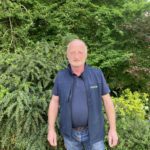 Colm Flynn is a 4th generation lifelong farmer from Athy county Kildare. The land has been intensively farmed for cereal production for many years. About 7 ago, having experienced and understood the impacts of intensive tillage on the soil health, Colm decided it was time to re-evaluate his farming practices. He is actively involved in the Danú farming project and has spent the past number of years working to rehabilitate soil using biological solutions – “learning how to rehabilitate a commercial farm in a commercial context and find alternatives to chemical applications.” Part of his involvement in the project included reintroducing grasses and multispecies swards to the farm – allowing the land to rest, building organic matter and regenerating the soil biology. The farm is currently 50% cereal production, producing spring peas, winter barley, oats and wheat. The remaining 50% is under grassland and used for silage production and cattle grazing. Colm has always been interested in nature and wildlife. Areas of mature woodland on the farm serve as habitats for hares, foxes and badgers. He has planted an orchard on the farm, most of which is left as food for birds and insects. There are numerous species of birds on the land including finches, mistle thrush, jackdaws, long-eared owls and barn owls. Colm continues to work hard to create a farm that is productive, economically viable and ecologically biodiverse – “I recorded 33 species of birds come through the farm this winter. I did an audit of the plants that grow on the farm and 84 plant species were recorded – from the tiniest little flowering plant to rushes to wild orchids. I hope in a few years time that the number of plant species on the farm will have increased.” More information on Colm’s farm here. Ambassador since 2022
Colm Flynn is a 4th generation lifelong farmer from Athy county Kildare. The land has been intensively farmed for cereal production for many years. About 7 ago, having experienced and understood the impacts of intensive tillage on the soil health, Colm decided it was time to re-evaluate his farming practices. He is actively involved in the Danú farming project and has spent the past number of years working to rehabilitate soil using biological solutions – “learning how to rehabilitate a commercial farm in a commercial context and find alternatives to chemical applications.” Part of his involvement in the project included reintroducing grasses and multispecies swards to the farm – allowing the land to rest, building organic matter and regenerating the soil biology. The farm is currently 50% cereal production, producing spring peas, winter barley, oats and wheat. The remaining 50% is under grassland and used for silage production and cattle grazing. Colm has always been interested in nature and wildlife. Areas of mature woodland on the farm serve as habitats for hares, foxes and badgers. He has planted an orchard on the farm, most of which is left as food for birds and insects. There are numerous species of birds on the land including finches, mistle thrush, jackdaws, long-eared owls and barn owls. Colm continues to work hard to create a farm that is productive, economically viable and ecologically biodiverse – “I recorded 33 species of birds come through the farm this winter. I did an audit of the plants that grow on the farm and 84 plant species were recorded – from the tiniest little flowering plant to rushes to wild orchids. I hope in a few years time that the number of plant species on the farm will have increased.” More information on Colm’s farm here. Ambassador since 2022
Colm Gavin (Co.Mayo)
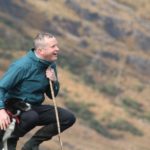 Colm Gavin is an 8th generation farmer, farming in the Bundorragha catchment in Mayo. He farms 90-100 Mayo blackface ewes. The sheep are out on the mountain year-round, grazing the multi-species natural vegetation and maintaining the land. Colm operates a very extensive hill farming operation and very few external inputs are required on the farm. Colm is involved in the Pearl Mussel Project EIP. This project rewards participant farmers for the ecological quality of their land, which in turn contributes to the pristine water quality needed by the Freshwater Pearl Mussel. As part of his work in this project, Colm continues to remove invasive rhododendron from the mountain, as well as installing silt traps to capture excess sand/silt runoff from the land before it enters the river. He has also put in livestock bridges at various points along the riverfront to further protect the water quality. “Being part of the Pearl Mussel Project EIP puts value on land that we wouldn’t have considered highly valuable in the past. These areas have actually turned out to be the most important areas on the farm in terms of biodiversity.” Passionate about the beautiful landscape and nature that makes up his farm, Colm sees himself as a caretaker of the land and hopes the pass it on to the next generation in better condition than which he found it; “as a hill farmer – all you’re doing is maintaining the land.” More information on Colm’s farm here. Ambassador since 2021
Colm Gavin is an 8th generation farmer, farming in the Bundorragha catchment in Mayo. He farms 90-100 Mayo blackface ewes. The sheep are out on the mountain year-round, grazing the multi-species natural vegetation and maintaining the land. Colm operates a very extensive hill farming operation and very few external inputs are required on the farm. Colm is involved in the Pearl Mussel Project EIP. This project rewards participant farmers for the ecological quality of their land, which in turn contributes to the pristine water quality needed by the Freshwater Pearl Mussel. As part of his work in this project, Colm continues to remove invasive rhododendron from the mountain, as well as installing silt traps to capture excess sand/silt runoff from the land before it enters the river. He has also put in livestock bridges at various points along the riverfront to further protect the water quality. “Being part of the Pearl Mussel Project EIP puts value on land that we wouldn’t have considered highly valuable in the past. These areas have actually turned out to be the most important areas on the farm in terms of biodiversity.” Passionate about the beautiful landscape and nature that makes up his farm, Colm sees himself as a caretaker of the land and hopes the pass it on to the next generation in better condition than which he found it; “as a hill farmer – all you’re doing is maintaining the land.” More information on Colm’s farm here. Ambassador since 2021
Cyril Ó Flaithearta (Co.Galway)
Cyril runs the family farm, based on Inis Mór island in Co. Galway, keeping beef cows and selling weanling calves and/or stores. The highly fragmented farm, with up on 80% of its area within an SAC runs from one side of the island to the other and contains fine examples of species rich grassland and the associated biodiversity. Active management by Cyril and his family maintain these stunning grasslands. It takes a lot of work to rebuild stone walls to control the grazing livestock, to ensure fresh water supplies on the small fragmented fields and to control encroaching bramble and scrub. Cyril’s work is a continuance of the traditional winterage management system that has created and maintained these grasslands for many generations, but he is also adopting new methods such as improvements in animal breeding and nutrition to improve the agricultural output of the farm. More information on Cyril’s farm here. Ambassador since 2020
Darina Allen (Co.Cork)
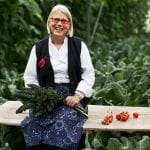 Darina has a mixed stock organic farm with her husband. The farm includes one acre wide glasshouses which yield an abundance of fruit and vegetables, and is home to free-range pigs, beef, approximately 600 hens and dairy cows which are milked daily to produce local cheese and yoghurt. The patch is also often used to test experimental planting and sowing techniques such as biodynamic planting – sowing crops in harmony with the various phases of the moon – with the aim of optimising yield, flavour and quality. Darina is totally passionate about the soil and believes the healthier the soil, the healthier the plant, the animals and the humans. Another biodiversity friendly technique incorporated is the use of green manure – the incorporation of certain green plants back into the soil, which improves the soil structure; increases soil biodiversity, helps to prevent soil erosion and helps to reduce pests and diseases affecting plants & vegetables. It is a circular economy with zero waste. The core philosophy of the farm is sustainable food production whilst also building up wildflower meadows, recording insects, swift boxes and house martens, not cutting hedgerows and planting edible hedgerows for wildlife and shelter. Core to Darina’s work is sharing ideas on food sustainability with others through a permanent on-site cookery school. More information and a short podcast on Darina’s farm here. Ambassador since 2019
Darina has a mixed stock organic farm with her husband. The farm includes one acre wide glasshouses which yield an abundance of fruit and vegetables, and is home to free-range pigs, beef, approximately 600 hens and dairy cows which are milked daily to produce local cheese and yoghurt. The patch is also often used to test experimental planting and sowing techniques such as biodynamic planting – sowing crops in harmony with the various phases of the moon – with the aim of optimising yield, flavour and quality. Darina is totally passionate about the soil and believes the healthier the soil, the healthier the plant, the animals and the humans. Another biodiversity friendly technique incorporated is the use of green manure – the incorporation of certain green plants back into the soil, which improves the soil structure; increases soil biodiversity, helps to prevent soil erosion and helps to reduce pests and diseases affecting plants & vegetables. It is a circular economy with zero waste. The core philosophy of the farm is sustainable food production whilst also building up wildflower meadows, recording insects, swift boxes and house martens, not cutting hedgerows and planting edible hedgerows for wildlife and shelter. Core to Darina’s work is sharing ideas on food sustainability with others through a permanent on-site cookery school. More information and a short podcast on Darina’s farm here. Ambassador since 2019
David Dennison (Co.Waterford)
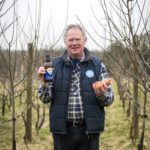 David Dennison runs a vineyard and orchard in County Waterford. David is the founder of Viking Irish Drinks, producing craft wine and cider on his farm in Waterford. The 1-hectare vineyard, which was planted in 2010, provides red and white grapes for wine. There is 2.2 hectares of cider apple trees to produce craft cider. They also produce liqueurs and are now experimenting with alcohol-free beverages. They grow blackcurrants and blackberries on the land, as well as keeping some hives of honeybees. The entire system is managed with huge sensitivity towards nature and wildlife on the land. David is in the process of Organic conversion; however no chemical sprays have been used on the farm in 20 years. There are different habitats on the farm including woodland areas, meadow, thick hedgerows and 1.5 acres of wetland. Research by the National Biodiversity Data Center stated there are very healthy populations of insects on the land, including bees, hoverflies, beetles. An array of different birds live on the farm including jay thrushes, swallows, buzzards, snipe, woodcock, goldfinches and hen pheasants. There is a reed-bed system to clean wastewater from the wine and cider production. In 2008 David planted an area of nut trees including hazelnut, cobnut and walnuts trees in an effort to provide habitat for red squirrel on the land. More information on David’s farm here. Ambassador since 2022
David Dennison runs a vineyard and orchard in County Waterford. David is the founder of Viking Irish Drinks, producing craft wine and cider on his farm in Waterford. The 1-hectare vineyard, which was planted in 2010, provides red and white grapes for wine. There is 2.2 hectares of cider apple trees to produce craft cider. They also produce liqueurs and are now experimenting with alcohol-free beverages. They grow blackcurrants and blackberries on the land, as well as keeping some hives of honeybees. The entire system is managed with huge sensitivity towards nature and wildlife on the land. David is in the process of Organic conversion; however no chemical sprays have been used on the farm in 20 years. There are different habitats on the farm including woodland areas, meadow, thick hedgerows and 1.5 acres of wetland. Research by the National Biodiversity Data Center stated there are very healthy populations of insects on the land, including bees, hoverflies, beetles. An array of different birds live on the farm including jay thrushes, swallows, buzzards, snipe, woodcock, goldfinches and hen pheasants. There is a reed-bed system to clean wastewater from the wine and cider production. In 2008 David planted an area of nut trees including hazelnut, cobnut and walnuts trees in an effort to provide habitat for red squirrel on the land. More information on David’s farm here. Ambassador since 2022
David Kerr (Co. Laois)
David Kerr is a commercial dairy farmer from Ballyfin Co Laois. He milks 150 cross-bred cows, “following the old farming mantra of one cow to the acre”. He also keeps a small flock of Dorset Horn sheep on the farm. 20% of the land has been reseeded with multispecies swards and clover and this has helped reduce the amount of artificial nitrogen spread on the land. There is 3 acres of woodland on the farm, mainly oak, which was planted by Davids late father George. To honour the passing of George in 2021, David devoted an area of land to a 1.5 acre wildlife pond on the farm. David has left approximately 12% of his farm as non-commercially productive land and he values this land for its biodiversity and wildlife value. More information on David’s farm here. Ambassador since 2023.
Donal Sheehan (Co.Cork)
Donal, along with his wife Ita and two children, farms a 70-cow dairy herd on ‘Blossom Farm’ near Castlelyons, in the Bride valley, Co. Cork. While Donal runs what would at first be considered a ‘typical’ intensive farm, he has a keen interest in farming in a more nature-friendly way. As he puts it ‘we try to push the boat out all the time trying to make farming around here more sustainable’. He dedicates a proportion of his farm to biodiversity including ponds, pollinator strips and wild bird cover for overwintering birds. He keeps bees and farms with these in mind minimising herbicide use. He doesn’t cut hedges and has energy saving devices on his milking machines. Donal believes farmers can make a huge difference in improving biodiversity, lowering their carbon footprint and improving the quality of our water. Such is his conviction and vision, that he is one of the main drivers of an innovative new pilot project called The BRIDE (Biodiversity Regeneration In a Dairying Environment) Project which rewards farmers for delivering measurable improvements in biodiversity over a 5 year period. Donal is a very eloquent advocate for – and exponent of – farming for nature. More information and a short film on Donal’s farm here. Ambassador since 2018
Donna Mullen (Co.Meath)
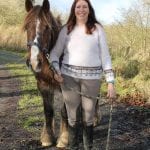 Donna and her husband brought their 43-acre farm twenty years ago. It initially comprised of three large fields of intensive grassland with little plant or animal diversity. Through their work and dedication, it has been transformed into a nature reserve. They have planted 7 ½ acres of bird seed crop – oats, linseed and kale. There are now twenty-two species of birds on the farm, including species new to the farm: buzzards, mallard ducks, jays, woodcock and grasshopper warblers. 15 acres of woodland was added to increase species diversity. Two orchards of heritage Irish apple trees were planted as was an acre of wildflower meadow for pollinators. Over the last six years 1km of hedgerow has been planted. Hedgehogs were reintroduced last year and pine martins were recorded on the farm for the first time last year. A lake was created to encourage newts. Over 50 bat boxes are located on the farm. What Donna and her family are doing on their farm is easily replicable, providing diverse habitats to encourage diverse species. More information on Donna’s farm and a podcast can be listened to here. Ambassador since 2019
Donna and her husband brought their 43-acre farm twenty years ago. It initially comprised of three large fields of intensive grassland with little plant or animal diversity. Through their work and dedication, it has been transformed into a nature reserve. They have planted 7 ½ acres of bird seed crop – oats, linseed and kale. There are now twenty-two species of birds on the farm, including species new to the farm: buzzards, mallard ducks, jays, woodcock and grasshopper warblers. 15 acres of woodland was added to increase species diversity. Two orchards of heritage Irish apple trees were planted as was an acre of wildflower meadow for pollinators. Over the last six years 1km of hedgerow has been planted. Hedgehogs were reintroduced last year and pine martins were recorded on the farm for the first time last year. A lake was created to encourage newts. Over 50 bat boxes are located on the farm. What Donna and her family are doing on their farm is easily replicable, providing diverse habitats to encourage diverse species. More information on Donna’s farm and a podcast can be listened to here. Ambassador since 2019
Edmund Joyce (Co.Carlow)
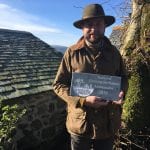 Edmund Joyce is a drystock farmer from near Borris in Co Carlow. He was nominated in 2018 for the Farming For Nature Awards. He runs a herd of limousin-cross suckler cows and a flock of commercial Suffolk-cross ewes on the 125 acre holding. Since taking over the farm in 2007 Edmund has planted over 6000 native trees in different newly established groves around the farm. Red squirrels are a regular sight on his farm, and all 15 bird boxes have been occupied each year, even a pair of great spotted woodpeckers took up residence in one of the boxes this year. Both Soprano Pipistrelle bats and Brown Long Eared bats also present in the woodland. Whilst a number of barn owls are particularly attracted to the long grasses in an established wild meadow area and are nesting in the trees. The native apple orchard planted about 7 years ago is providing an abundance of fruit whilst the cottage garden has also been planted up with flowers and shrubs which are a haven for bees, butterflies and hedgehogs. Edmund chose the planting to compliment the setting whilst also providing a succession of plants from early spring right through to winter for nectar feeding insects. Water voles occupy a watercourse which runs the length of the farm whilst the dry-stone granite walls that subdivide the farm have provided ideal cover for other small mammals including stoats and pine martens. More information on Edmund’s farm and a film can be viewed here. Ambassador since 2019
Edmund Joyce is a drystock farmer from near Borris in Co Carlow. He was nominated in 2018 for the Farming For Nature Awards. He runs a herd of limousin-cross suckler cows and a flock of commercial Suffolk-cross ewes on the 125 acre holding. Since taking over the farm in 2007 Edmund has planted over 6000 native trees in different newly established groves around the farm. Red squirrels are a regular sight on his farm, and all 15 bird boxes have been occupied each year, even a pair of great spotted woodpeckers took up residence in one of the boxes this year. Both Soprano Pipistrelle bats and Brown Long Eared bats also present in the woodland. Whilst a number of barn owls are particularly attracted to the long grasses in an established wild meadow area and are nesting in the trees. The native apple orchard planted about 7 years ago is providing an abundance of fruit whilst the cottage garden has also been planted up with flowers and shrubs which are a haven for bees, butterflies and hedgehogs. Edmund chose the planting to compliment the setting whilst also providing a succession of plants from early spring right through to winter for nectar feeding insects. Water voles occupy a watercourse which runs the length of the farm whilst the dry-stone granite walls that subdivide the farm have provided ideal cover for other small mammals including stoats and pine martens. More information on Edmund’s farm and a film can be viewed here. Ambassador since 2019
Eoghan Daltun (Co.Cork)
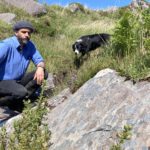 Eoghan Daltun runs a high nature value (HNV) farm and rewilding project on the Beara peninsula of Co. Cork. “The farm is all about productivity of biodiversity and nature. That is the primary aim.” The main block of private land is 21.5 acres, the majority of which is highly species-rich native Atlantic temperate rainforest. “The native woodland is incredibly species rich, this part of Ireland is recognized by biologists as a ‘biodiversity hotspot’ in terms of bryophytes (mosses and liverworts)”. The woodland consists of old sessile oaks and range of other wild native tree species. The understory is equally as species-rich and diverse, consisting of a vast array of wildflowers, ferns, mosses, lichen and fungi. The farm is home to an array of wildlife, including some rare species like the Lesser Horseshoe Bat, the Marsh Fritillary Butterfly and the Kerry Slug. The next block of land is a mix of native woodland and species-rich grassland. The final block of land is commonage. Previously a sheep farmer, Eoghan has recently replaced his flock of sheep with a small herd of Dexter cattle. He believes the cattle, as they are non-selective grazers, are better suited to his HNV farming practice and to the regeneration of the land. The plan is to graze the cattle on the commonage during the summer months and then bring them back to the lower lands during the winter – emulating the very old practice of ‘booleying’ which involved moving animals to the uplands during the summer season. More information on Eoghan’s farm here. Ambassador since 2021
Eoghan Daltun runs a high nature value (HNV) farm and rewilding project on the Beara peninsula of Co. Cork. “The farm is all about productivity of biodiversity and nature. That is the primary aim.” The main block of private land is 21.5 acres, the majority of which is highly species-rich native Atlantic temperate rainforest. “The native woodland is incredibly species rich, this part of Ireland is recognized by biologists as a ‘biodiversity hotspot’ in terms of bryophytes (mosses and liverworts)”. The woodland consists of old sessile oaks and range of other wild native tree species. The understory is equally as species-rich and diverse, consisting of a vast array of wildflowers, ferns, mosses, lichen and fungi. The farm is home to an array of wildlife, including some rare species like the Lesser Horseshoe Bat, the Marsh Fritillary Butterfly and the Kerry Slug. The next block of land is a mix of native woodland and species-rich grassland. The final block of land is commonage. Previously a sheep farmer, Eoghan has recently replaced his flock of sheep with a small herd of Dexter cattle. He believes the cattle, as they are non-selective grazers, are better suited to his HNV farming practice and to the regeneration of the land. The plan is to graze the cattle on the commonage during the summer months and then bring them back to the lower lands during the winter – emulating the very old practice of ‘booleying’ which involved moving animals to the uplands during the summer season. More information on Eoghan’s farm here. Ambassador since 2021
Feargal Ó Cuinneagáin (Co.Mayo)
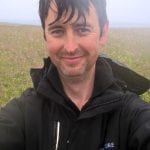 Feargal has 25 acres on the Mullet Peninsula where his primary objective is to return Corncrakes to the farm, while also boosting wider biodiversity including Twite (another ‘red-list’ bird), Chough, Barnacle Geese, pollinators, and habitats in their own right like a species-rich fen. Working on a farm plan with the National Parks and Wildlife Service, Feargal is designing and implementing a series of measures to convert what was a rather lifeless monoculture of grass to a tapestry full of colour, sights and sounds as would have been commonplace throughout the Irish countryside in previous generations. Feargal has not only created a haven for important habitats and species, but is also trialling new and innovative measures in managing for wildlife on productive agricultural land. Since Feargal began farming for nature here, there has been a remarkable increase in the rare and threatened wildlife on his farm. More information on Feargal’s farm and a podcast can be found here. Ambassador since 2019
Feargal has 25 acres on the Mullet Peninsula where his primary objective is to return Corncrakes to the farm, while also boosting wider biodiversity including Twite (another ‘red-list’ bird), Chough, Barnacle Geese, pollinators, and habitats in their own right like a species-rich fen. Working on a farm plan with the National Parks and Wildlife Service, Feargal is designing and implementing a series of measures to convert what was a rather lifeless monoculture of grass to a tapestry full of colour, sights and sounds as would have been commonplace throughout the Irish countryside in previous generations. Feargal has not only created a haven for important habitats and species, but is also trialling new and innovative measures in managing for wildlife on productive agricultural land. Since Feargal began farming for nature here, there has been a remarkable increase in the rare and threatened wildlife on his farm. More information on Feargal’s farm and a podcast can be found here. Ambassador since 2019
Fergal Anderson & Emanuela Russo (Co.Galway)
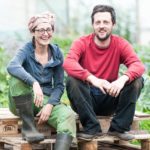
Fergal Anderson & Emanuela Russo run a market garden in Loughrea county Galway. The farm is comprised of 30 acres in total, 25 of which is mixed forestry. The remaining 5 acres are used to produce a vast range of agroecologically produced vegetables and fruits, including but not limited to, beets, chard, kale, radish, blackcurrants, gooseberries, loganberries, apples, plums, pears and a range of medicinal herbs. They sell their produce direct to customers and supply restaurants in Galway. Fergal and Emanuela have been working on the land for 8 years – gradually building the soil and transforming the land into a productive farm that is economically and ecologically sustainable. Bees are kept on the farm and they plan to reintroduce chickens and include them in their vegetable rotation system. They use a diverse range of green manures on the farm to increase the fertility of the soil as well as enhancing the soil biology and structure. They grow summer green manure crops to provide food for insects. The farm is full of biodiversity – there is a stream in the woodland which has crayfish and otter in it. There are two small ponds on the farm with frogs and newts. There are red squirrel and pine marten, foxes, hares, bats and sparrowhawks. They have planted ‘natural edges’ around the land with hazel, hawthorn and other native trees. They leave ‘wild spaces’ around as much of the land as possible to further increase biodiversity on the farm. More information on Fergal and Emanuela’s farm here. Ambassadors since 2021
Fergal Smith (Co.Clare)
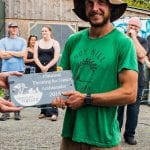 Fergal Smith is one of the main drivers behind Moyhill Community Farm, a regenerative agriculture farm. At the farm they currently manage 66 acre of land with their main enterprise being 2 no dig market gardens both with roughly 100 x 30metre beds in each, and four tunnels. Their aim is to regenerate soil, so they are bringing more animal enterprises on each year. Currently they have a small flerd of six cows and ten sheep. They run a turkey enterprise for Christmas with 160 birds this year and they have three pigs, which they have been using to clear rough land over the past seven years. They next plan to bring on laying hens, and increase the flerd. They follow holistic management whereby all their animals are moved on daily or twice daily system. They are inspired by the Savory Institute, and hope to become a Savory hub in the future. They have a strong connection to the local community; all their sales are through direct selling models (CSA, market, farm shop, Reko ring, Neighbour food) and local restaurants. They have planted 26,000 trees on the farm in an agri-forestry system (wind breaks, hedgerows and alleyways). Outside of regenerating land, education is their other focus; they offer this through internships, open work days, and are building a farm system that needs more employees, as an alternative to being a stand alone farmer. More information on Moyhill farm here. Ambassador since 2019
Fergal Smith is one of the main drivers behind Moyhill Community Farm, a regenerative agriculture farm. At the farm they currently manage 66 acre of land with their main enterprise being 2 no dig market gardens both with roughly 100 x 30metre beds in each, and four tunnels. Their aim is to regenerate soil, so they are bringing more animal enterprises on each year. Currently they have a small flerd of six cows and ten sheep. They run a turkey enterprise for Christmas with 160 birds this year and they have three pigs, which they have been using to clear rough land over the past seven years. They next plan to bring on laying hens, and increase the flerd. They follow holistic management whereby all their animals are moved on daily or twice daily system. They are inspired by the Savory Institute, and hope to become a Savory hub in the future. They have a strong connection to the local community; all their sales are through direct selling models (CSA, market, farm shop, Reko ring, Neighbour food) and local restaurants. They have planted 26,000 trees on the farm in an agri-forestry system (wind breaks, hedgerows and alleyways). Outside of regenerating land, education is their other focus; they offer this through internships, open work days, and are building a farm system that needs more employees, as an alternative to being a stand alone farmer. More information on Moyhill farm here. Ambassador since 2019
Gearoid Maher (Co.Limerick)
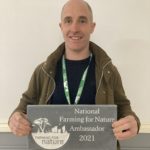 Gearoid Maher farms 80 hectares in Co. Limerick. He has a dairy herd of purebred friesians, milking 80 cows in total. The animals graze from mid-March to the end of October. Hay and silage are cut from the land and fed to the cattle during the winter months. Gearoid feeds locally grown sugar beet to the cows over winter, this has halved the amount of concentrates fed on the farm. The land is a heavy clay type and requires careful management. Gearoid carries out regular soil tests to determine what specific nutrients are required in each field and at what exact quantity – “I reduced my nitrogen use by approx. 25% on the farm last year as I now have the proper equipment.” He has been gradually increasing the clover content in the grassland and has sown some multispecies grass swards on the farm – with the aim of improving the soil biology and reducing the amount of fertilizer needed in the future. Gearoid is passionate about increasing biodiversity on the farm. He has planted trees all around the farm, an orchard by the house, as well as hedges and tree lines throughout the fields. There is 20 acres of forestry on the land and the aim is to thin the forest and allow the cows dig up and graze the ground vegetation which will help regenerate the forest floor. Gearoid doesn’t believe in chasing targets on his farm – he enjoys a slower pace of farming ensuring both his animals and nature thrive – “The old rule of thumb was a cow to the acre – and that has been my ethos all along. If I can farm a cow to the acre without pressure then that’s what I’ll do.” More information on Gearoid’s farm here. Ambassador since 2021
Gearoid Maher farms 80 hectares in Co. Limerick. He has a dairy herd of purebred friesians, milking 80 cows in total. The animals graze from mid-March to the end of October. Hay and silage are cut from the land and fed to the cattle during the winter months. Gearoid feeds locally grown sugar beet to the cows over winter, this has halved the amount of concentrates fed on the farm. The land is a heavy clay type and requires careful management. Gearoid carries out regular soil tests to determine what specific nutrients are required in each field and at what exact quantity – “I reduced my nitrogen use by approx. 25% on the farm last year as I now have the proper equipment.” He has been gradually increasing the clover content in the grassland and has sown some multispecies grass swards on the farm – with the aim of improving the soil biology and reducing the amount of fertilizer needed in the future. Gearoid is passionate about increasing biodiversity on the farm. He has planted trees all around the farm, an orchard by the house, as well as hedges and tree lines throughout the fields. There is 20 acres of forestry on the land and the aim is to thin the forest and allow the cows dig up and graze the ground vegetation which will help regenerate the forest floor. Gearoid doesn’t believe in chasing targets on his farm – he enjoys a slower pace of farming ensuring both his animals and nature thrive – “The old rule of thumb was a cow to the acre – and that has been my ethos all along. If I can farm a cow to the acre without pressure then that’s what I’ll do.” More information on Gearoid’s farm here. Ambassador since 2021
Gerard Deegan (Co. Westmeath)
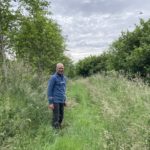 Gerard Deegan is a lifelong farmer from Co. Westmeath. The farm has been certified organic for over 20 years. Originally a dairy farmer, Gerard transitioned to a mixed beef and forestry enterprise back in 2012. There is now 100 acres of forestry on the land – 50% hardwood and 50% softwood. Gerard is an advocate for diverse forestry systems, he practices continuous cover forestry and has incorporated wildlife strips between rows of trees. There are approximately 60 different species of trees on the farm – including Norway spruce, Scots pine, Larch, Douglas Fir, Ash, Oak, Sycamore, Beech and many more. Gerard won the RDS Farm Forestry Award in 2019. Additionally, he manages a small suckler herd producing organic beef. He also keeps bees, producing honey for neighbours and friends. Gerard holds a holistic outlook on his farm, understanding and valuing the importance of every living creature on the land – from the microscopic soil fungi to the cattle, from the bees to the oak trees. “The bees are a lesson in life. They have taught me a lot about nature. How we are all connected, and how everyone has a role to play, no matter how big or small that role may be…” An advocate for the importance of community, Gerard is involved in Social Farming and a member of Leitrim Organic Farmers Coop since 1990. More information and view a film on Gerard’s farm here. Ambassador since 2021
Gerard Deegan is a lifelong farmer from Co. Westmeath. The farm has been certified organic for over 20 years. Originally a dairy farmer, Gerard transitioned to a mixed beef and forestry enterprise back in 2012. There is now 100 acres of forestry on the land – 50% hardwood and 50% softwood. Gerard is an advocate for diverse forestry systems, he practices continuous cover forestry and has incorporated wildlife strips between rows of trees. There are approximately 60 different species of trees on the farm – including Norway spruce, Scots pine, Larch, Douglas Fir, Ash, Oak, Sycamore, Beech and many more. Gerard won the RDS Farm Forestry Award in 2019. Additionally, he manages a small suckler herd producing organic beef. He also keeps bees, producing honey for neighbours and friends. Gerard holds a holistic outlook on his farm, understanding and valuing the importance of every living creature on the land – from the microscopic soil fungi to the cattle, from the bees to the oak trees. “The bees are a lesson in life. They have taught me a lot about nature. How we are all connected, and how everyone has a role to play, no matter how big or small that role may be…” An advocate for the importance of community, Gerard is involved in Social Farming and a member of Leitrim Organic Farmers Coop since 1990. More information and view a film on Gerard’s farm here. Ambassador since 2021
Gerard Walshe (Co.Galway)
Gerard is a part-time farmer who runs a 85-acres farm near Moycullen, Co. Galway. Its scrub, woodland, and species rich grassland. He manages that farm with the help of pedigree Belted Galloway cattle and is a enthusiastic believer and promoter of High Nature Value farming and farms with wildlife primarily in mind. He is a good example of how marginal land can be farmed ecologically through correct stocking rates and represents the growing amount of part-time farmers. “Farming needs to be supported toward ecological production not yield production” More information and a short film on Gerard’s farm here. Ambassador since 2019
Gerry Fitzsimons (Co.Cavan)
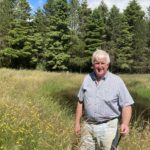 Gerry Fitzsimons is an organic beef farmer from Co Cavan. Having farmed conventionally for some years and seeing the damage that some of the conventional farming practices were having on nature on his land, he decided to go organic and farm in a more holistic manner. Gerry used to run suckler farm, but he now buys in a small number of angus bullocks every year and fattens them on the farm before selling them, mostly direct to customers via his meat scheme. Gerry has been running a grass-fed beef system for some 20 years. There is about 6 acres of birch woodland on the farm, and the land ranges from some good grassland to heavy land to bogland. Even though a lot of the grassland was reseeded in the 90s, a lot of plant diversity has returned to the pasture and Gerry now has some good multi species pasture again. The farming system is very extensive and external inputs are minimal. The cattle are in for a very short period over winter where they are bedded on rushes cut from the land. Some haylage is cut every year to supplement winter feeding. There is lots of space for biodiversity and wildlife on the farm, from bog and ponds to thick hedges, pockets of woodland and an orchard. Gerry is delighted to have a pair of nesting buzzards on the land. There are lots of frogs and newts on the farm, as well as badgers, foxes, rabbits and hares. Gerry and his family take a holistic approach to life and are passionate about protecting nature in any way possible – “Anything that I can do to encourage better care of our environment, on or off the farm, I’m happy to do it.” More information on Gerry’s farm here. Ambassador since 2022
Gerry Fitzsimons is an organic beef farmer from Co Cavan. Having farmed conventionally for some years and seeing the damage that some of the conventional farming practices were having on nature on his land, he decided to go organic and farm in a more holistic manner. Gerry used to run suckler farm, but he now buys in a small number of angus bullocks every year and fattens them on the farm before selling them, mostly direct to customers via his meat scheme. Gerry has been running a grass-fed beef system for some 20 years. There is about 6 acres of birch woodland on the farm, and the land ranges from some good grassland to heavy land to bogland. Even though a lot of the grassland was reseeded in the 90s, a lot of plant diversity has returned to the pasture and Gerry now has some good multi species pasture again. The farming system is very extensive and external inputs are minimal. The cattle are in for a very short period over winter where they are bedded on rushes cut from the land. Some haylage is cut every year to supplement winter feeding. There is lots of space for biodiversity and wildlife on the farm, from bog and ponds to thick hedges, pockets of woodland and an orchard. Gerry is delighted to have a pair of nesting buzzards on the land. There are lots of frogs and newts on the farm, as well as badgers, foxes, rabbits and hares. Gerry and his family take a holistic approach to life and are passionate about protecting nature in any way possible – “Anything that I can do to encourage better care of our environment, on or off the farm, I’m happy to do it.” More information on Gerry’s farm here. Ambassador since 2022
Graham Harris (Co.Kildare)
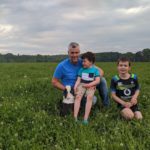 Graham Harris took over the family farm in 2003 and continued to farm the land conventionally until about 5 years ago. Since then, he has been gradually moving away from intensive systems towards holistic, regenerative practices. Guided by biodynamic principles, Graham has been focusing on “removing as many harmful practices from his farming system as possible”. The farm is now certified organic. In order to bring the land back into balance, huge focus has been on rebuilding the soil microbiology – “I firmly believe if I can get the soil right, then I don’t have to worry about much else.” The 170-acre farm is comprised of a mixed sheep and tillage enterprise. Cereals produced include organic oats, along with pea and barley combi-crops for animal feed. Graham uses a diverse variety of cover crops on the land throughout rotations – “incorporating cover crops that feed the soil and feed the pollinators.” Aiming to move away from mono-cropping, Graham has started experimenting with growing an understory of clover with the oat crops. Farmyard manure is composted and spread on the land as a fertilizer when necessary. Biodynamic preparations are also used on the land to regenerate the soil biology. Graham runs a flock of 130 Belclare/Charollais ewes, producing organic spring lamb. He has incorporated herbal leys into the grassland to increase plant diversity and build soil biology. Where in the past nettles and weeds would have been sprayed, Graham now encourages wild patches of plants to grow around field boundaries which act as nature corridors and provide habitats for birds and insects. More information on Graham’s farm here. Ambassador since 2021
Graham Harris took over the family farm in 2003 and continued to farm the land conventionally until about 5 years ago. Since then, he has been gradually moving away from intensive systems towards holistic, regenerative practices. Guided by biodynamic principles, Graham has been focusing on “removing as many harmful practices from his farming system as possible”. The farm is now certified organic. In order to bring the land back into balance, huge focus has been on rebuilding the soil microbiology – “I firmly believe if I can get the soil right, then I don’t have to worry about much else.” The 170-acre farm is comprised of a mixed sheep and tillage enterprise. Cereals produced include organic oats, along with pea and barley combi-crops for animal feed. Graham uses a diverse variety of cover crops on the land throughout rotations – “incorporating cover crops that feed the soil and feed the pollinators.” Aiming to move away from mono-cropping, Graham has started experimenting with growing an understory of clover with the oat crops. Farmyard manure is composted and spread on the land as a fertilizer when necessary. Biodynamic preparations are also used on the land to regenerate the soil biology. Graham runs a flock of 130 Belclare/Charollais ewes, producing organic spring lamb. He has incorporated herbal leys into the grassland to increase plant diversity and build soil biology. Where in the past nettles and weeds would have been sprayed, Graham now encourages wild patches of plants to grow around field boundaries which act as nature corridors and provide habitats for birds and insects. More information on Graham’s farm here. Ambassador since 2021
Henry O’ Donnell (Co.Donegal)
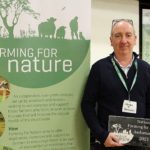 Henry O Donnell manages a mixed organic farm in the uplands of north Donegal. The 92-hectare farm is made up of different types of land – lowland pasture, marginal upland and commonage. He runs a flock of 60 horned upland ewes. The sheep enterprise is a low input and low-cost system. Henry also runs a herd of suckler cattle, half continental breeds and half Galloways, producing high quality organic beef. External inputs are extremely low on the farm. Henry has been experimenting with growing red clover swards for winter fodder, as well as multi-species swards for grazing on the lowlands. The animals graze a mixture of diverse vegetation throughout the year as they move from the lowlands to the uplands. Last year Henry moved the Galloways uphill even further to graze the commonage land – “Galloways have done an excellent job on the upland and commonage vegetation as they are non-selective grazers. They have removed a lot of millennia and dead grass, thus improving the biodiversity of the land. They have also improved the grazing for the sheep that are coming after them.” Henry is passionate about the importance of grazing animals in maintaining marginal uplands – through reducing fire risks, maintaining plant diversity and fertilizing the land. “My whole attitude is to try and have a farming system that works for the environment that I’m in…” He is a strong advocate for low-impact, high nature value farming systems and this is reflected in the way in which he runs his own farm in the hills of Donegal. More information on Henry’s farm here. Ambassador since 2021
Henry O Donnell manages a mixed organic farm in the uplands of north Donegal. The 92-hectare farm is made up of different types of land – lowland pasture, marginal upland and commonage. He runs a flock of 60 horned upland ewes. The sheep enterprise is a low input and low-cost system. Henry also runs a herd of suckler cattle, half continental breeds and half Galloways, producing high quality organic beef. External inputs are extremely low on the farm. Henry has been experimenting with growing red clover swards for winter fodder, as well as multi-species swards for grazing on the lowlands. The animals graze a mixture of diverse vegetation throughout the year as they move from the lowlands to the uplands. Last year Henry moved the Galloways uphill even further to graze the commonage land – “Galloways have done an excellent job on the upland and commonage vegetation as they are non-selective grazers. They have removed a lot of millennia and dead grass, thus improving the biodiversity of the land. They have also improved the grazing for the sheep that are coming after them.” Henry is passionate about the importance of grazing animals in maintaining marginal uplands – through reducing fire risks, maintaining plant diversity and fertilizing the land. “My whole attitude is to try and have a farming system that works for the environment that I’m in…” He is a strong advocate for low-impact, high nature value farming systems and this is reflected in the way in which he runs his own farm in the hills of Donegal. More information on Henry’s farm here. Ambassador since 2021
Irish Seed Savers Association (Co.Clare)
ISSA conserve Ireland’s threatened genetic resources and maintain a public seed bank of over 600 varieties of seed. They preserve heirloom and heritage food crop varieties that are suitable for Ireland and local growing conditions, contributing to the nation’s food security. They provide a unique service to the nation in terms of supply of organic heritage seeds and apples trees. The 20 acre farm, gardens and visitor trail at Capparoe, Scarriff, Co. Clare is an inspiration, ably demonstrating best practice in organic farming and farming for nature. They supply seeds of vegetables, grains, herbs and edible flowers, as well as apple trees the progeny of which, thanks to ISSA, adorn many an orchard across Ireland today. More information here. Ambassador since 2020
James Breslin (Co.Donegal)
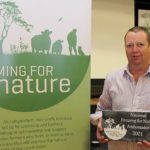 James Breslin, an Inishowen hill farmer, runs a suckler and sheep farm in Donegal. He has reintroduced Galloway cattle to his farm as he feels their hardy nature is well suited to the mountainous conditions of the land. “The Galloways work will with the sheep as they like to graze the taller grasses and the sheep like to graze the lower grasses.” Many of the animal’s live outdoors year-round, feeding on pasture and natural mountain vegetation during the summer months, and hay/silage during the winter. The animals are thriving in this systema and it reduces farm inputs like feed and fertilizer. James has resown some of the farmland with red clover swards and multi-species grass swards, further reducing the need for nitrogen fertilizer and increasing biodiversity on the farm – “when the red clover is in flower, you can hear it before you see it – because of the amount of bees it attracts”. These diverse swards help build soil fertility and improve soil structure. James has planted hundreds of native trees and continues to plant trees on his farm to create ‘green barns’ which serve as shelter for the animals while outdoors. He has dug 2 ponds on the farm to create a water habitat and encourage further biodiversity. He plans to create a riparian zone by planting trees along the riverbank to protect river water. A member of the of the Operational Group of the Inishowen EIP, James welcomes visitors to his farm to learn more about his farming system. More information on James’s farm here. Ambassador since 2021
James Breslin, an Inishowen hill farmer, runs a suckler and sheep farm in Donegal. He has reintroduced Galloway cattle to his farm as he feels their hardy nature is well suited to the mountainous conditions of the land. “The Galloways work will with the sheep as they like to graze the taller grasses and the sheep like to graze the lower grasses.” Many of the animal’s live outdoors year-round, feeding on pasture and natural mountain vegetation during the summer months, and hay/silage during the winter. The animals are thriving in this systema and it reduces farm inputs like feed and fertilizer. James has resown some of the farmland with red clover swards and multi-species grass swards, further reducing the need for nitrogen fertilizer and increasing biodiversity on the farm – “when the red clover is in flower, you can hear it before you see it – because of the amount of bees it attracts”. These diverse swards help build soil fertility and improve soil structure. James has planted hundreds of native trees and continues to plant trees on his farm to create ‘green barns’ which serve as shelter for the animals while outdoors. He has dug 2 ponds on the farm to create a water habitat and encourage further biodiversity. He plans to create a riparian zone by planting trees along the riverbank to protect river water. A member of the of the Operational Group of the Inishowen EIP, James welcomes visitors to his farm to learn more about his farming system. More information on James’s farm here. Ambassador since 2021
James Gilmartin (Co. Leitrim)
James Gilmartin is a 7th generation farmer, who farms alongside his father in North County Leitrim. James runs a mixed organic farm. He keeps a suckler herd and a small herd of Dexters, as well as a small flock of sheep. He keeps a bees and chickens too, producing honey and eggs for local customers. As a farmer, James doesn’t want to push the land beyond its natural capability, thus low stocking density, low external inputs and extensive management of the land are crucial elements of his farming system. Through the NPWS Farm Plan Scheme, James is just one of a few farmers currently trialling NoFence cattle collars to deliver targeted grazing in an upland setting. He has installed PV panels on the shed roof. There is a small pond on the farm and James enjoys planting trees and hedges on the farm every year. More information on James’ farm here. Ambassador since 2023.
James Ham (Co.Westmeath)
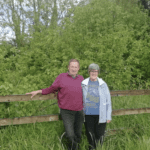 James Ham farms along his wife Martina in Mooyvore Co. Westmeath. Their 52ha farm is 50% under woodland/forestry and the other 50% is mature multispecies pasture including approximately 4ha of spring barley which is used for feed and straw. James has worked hard at greatly reducing the number of chemical inputs on the farm over the years. No insecticides have ever been used on the farm, and over the last 10 years the level of fungicide used on the crop has been reduced to the point that none was applied last year. Chemical fertiliser inputs have also been cut back and replaced with farmyard manure. They run a small suckler herd of about 20 Aubrac cows. There is over 4000 metres of hedgerow on the farm, equivalent to approx. 1.5ha of linear woodland, which is left mostly left untrimmed. Regular hedge maintenance is by traditional hedge laying. These thick and mature hedges provide not only a crucial habitat for birds and insects, but also shelter for the livestock. The continuous cover forestry system contains a wide range of hardwood and softwood trees. Tree species include hawthorn, blackthorn, spindle, crab apple, oak, elm, holly, sycamore, alder, beech, birch, Norway Spruce, Douglas Fir, Larch, Scots Pine and more. James maximised the amount of open spaces within the forestry plantations to help create wildflower reservoirs for insects and the wet areas and drains are ideal for dragonflies. “The afforested half of the farm, despite being relatively young, has greatly improved the amount of wildlife on the farm. Pine martin are now present, and the Jays are obviously doing their job, as we see little oak and hazel seedlings all over the site.” More information on James’s farm and view a short video here. Ambassador since 2022
James Ham farms along his wife Martina in Mooyvore Co. Westmeath. Their 52ha farm is 50% under woodland/forestry and the other 50% is mature multispecies pasture including approximately 4ha of spring barley which is used for feed and straw. James has worked hard at greatly reducing the number of chemical inputs on the farm over the years. No insecticides have ever been used on the farm, and over the last 10 years the level of fungicide used on the crop has been reduced to the point that none was applied last year. Chemical fertiliser inputs have also been cut back and replaced with farmyard manure. They run a small suckler herd of about 20 Aubrac cows. There is over 4000 metres of hedgerow on the farm, equivalent to approx. 1.5ha of linear woodland, which is left mostly left untrimmed. Regular hedge maintenance is by traditional hedge laying. These thick and mature hedges provide not only a crucial habitat for birds and insects, but also shelter for the livestock. The continuous cover forestry system contains a wide range of hardwood and softwood trees. Tree species include hawthorn, blackthorn, spindle, crab apple, oak, elm, holly, sycamore, alder, beech, birch, Norway Spruce, Douglas Fir, Larch, Scots Pine and more. James maximised the amount of open spaces within the forestry plantations to help create wildflower reservoirs for insects and the wet areas and drains are ideal for dragonflies. “The afforested half of the farm, despite being relatively young, has greatly improved the amount of wildlife on the farm. Pine martin are now present, and the Jays are obviously doing their job, as we see little oak and hazel seedlings all over the site.” More information on James’s farm and view a short video here. Ambassador since 2022
Jim Cronin (Co.Clare)
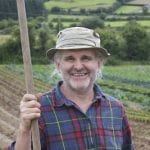 Jim Cronin has a 16-acres organic market garden farm in Co.Clare where he has been adopting biological agriculture principles for the last 30 years without loosing many of the traditional methods of farming. Jim’s entire farming ethos is seamlessly entwined with nature conservation. Not only does he create a habitat for pollinators and wildlife but also for all the unseen worms and micro-organisms which are fundamental to growing crops and sustaining life above ground. Jim has both a small suckler herd and 2 working horses that both help work the land and provide essential manure for soil fertility. Jim is both a teacher and a commercial grower of fruit and vegetables. Jim both combines the old traditions with new knowledge and methods based on sound principals as well as proves that one can make a good commercial yield from a small area without compromising nature. “Listen to your heart, yes you have to make money, but every farmer I know is a custodian of the land and intrinsically knows what is best for nature”. He has distilled his farm knowledge down to an exact science and created a bank of wisdom. Everything Jim does is a deliberate move to try to harness the resources that nature already offers us in terms of soil health, pest control and crop growth. Most importantly there is the unquestioning fact that he loves what he does and what he does is a truly beautiful way of farming for nature. More information and a short film on Jim’s farm here. Ambassador since 2020
Jim Cronin has a 16-acres organic market garden farm in Co.Clare where he has been adopting biological agriculture principles for the last 30 years without loosing many of the traditional methods of farming. Jim’s entire farming ethos is seamlessly entwined with nature conservation. Not only does he create a habitat for pollinators and wildlife but also for all the unseen worms and micro-organisms which are fundamental to growing crops and sustaining life above ground. Jim has both a small suckler herd and 2 working horses that both help work the land and provide essential manure for soil fertility. Jim is both a teacher and a commercial grower of fruit and vegetables. Jim both combines the old traditions with new knowledge and methods based on sound principals as well as proves that one can make a good commercial yield from a small area without compromising nature. “Listen to your heart, yes you have to make money, but every farmer I know is a custodian of the land and intrinsically knows what is best for nature”. He has distilled his farm knowledge down to an exact science and created a bank of wisdom. Everything Jim does is a deliberate move to try to harness the resources that nature already offers us in terms of soil health, pest control and crop growth. Most importantly there is the unquestioning fact that he loves what he does and what he does is a truly beautiful way of farming for nature. More information and a short film on Jim’s farm here. Ambassador since 2020
Joe and Aoife Reilly (Co.Mayo)
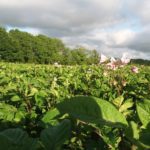 Joe and Aoife Reilly of Glasraí Farm run a 7.5 acre organic market garden in Hollymount, county Mayo. Biodiversity is of huge importance on the farm – “We farm with the earth as our core value and encourage a biodiverse, vibrant, healthy eco-system rather than a monoculture farm”. The farm is highly productive not only in terms of food production, but in terms of soil health and wildlife as well. On the farm there are 3 ponds, mixed hedgerows and a variety of trees, all of which provide habitats for wildlife. They promote ‘wild areas’ on the farm where natural vegetation can grow and support insects and birds throughout the year. Soil health is crucial on Glasraí farm. Cover crops containing diverse plant species are planted in rotation with vegetable crops throughout the year to allow to the soil to rest and to regenerate the soil biology. Composting also plays a crucial role in maintaining soil fertility. Glasraí Farm are passionate about providing fresh, healthy food to their local community. The farm produces a vast range of organic herbs and vegetables – from fennel to cauliflower to potatoes and beyond. They sell direct to their customers via farmers markets and online, as well as selling to local cafes and restaurants. Glasraí farm value teamwork – what started off as a family farm now consists of an energetic collaboration of 6 passionate employees – “Having a good team to work with and creating local employment is really important to us”. More information on Reilly’s farm here. Ambassador since 2021
Joe and Aoife Reilly of Glasraí Farm run a 7.5 acre organic market garden in Hollymount, county Mayo. Biodiversity is of huge importance on the farm – “We farm with the earth as our core value and encourage a biodiverse, vibrant, healthy eco-system rather than a monoculture farm”. The farm is highly productive not only in terms of food production, but in terms of soil health and wildlife as well. On the farm there are 3 ponds, mixed hedgerows and a variety of trees, all of which provide habitats for wildlife. They promote ‘wild areas’ on the farm where natural vegetation can grow and support insects and birds throughout the year. Soil health is crucial on Glasraí farm. Cover crops containing diverse plant species are planted in rotation with vegetable crops throughout the year to allow to the soil to rest and to regenerate the soil biology. Composting also plays a crucial role in maintaining soil fertility. Glasraí Farm are passionate about providing fresh, healthy food to their local community. The farm produces a vast range of organic herbs and vegetables – from fennel to cauliflower to potatoes and beyond. They sell direct to their customers via farmers markets and online, as well as selling to local cafes and restaurants. Glasraí farm value teamwork – what started off as a family farm now consists of an energetic collaboration of 6 passionate employees – “Having a good team to work with and creating local employment is really important to us”. More information on Reilly’s farm here. Ambassador since 2021
Joe and Eileen Condon (Co.Tipperary)
Joe and Eileen farm 50-acres of enclosed farmland along with 1000 acres of commonage in the Knockmealdown Mountains, Co. Tipperary. They keep a herd of Belted Galloways and Galloways which are 100% grass fed and organic. They chose these cattle as they are well suited to the uplands, can be outside all year and can have a positive impact on their environment by controlling invasive species. They sell direct to customer. They are a good example of farmers that manage commonage ecologically and have their cattle outside 12 months of the year. “We don’t feel hard done by working with this land, we can see its benefits and how to capitalise on that is to work in sync with nature than trying to manipulate nature to give you something that isn’t naturally there.” More information and a short film on Joe and Eileen’s farm here. Ambassadors since 2019
John McHugh (Co.Laois)
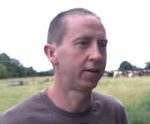 John McHugh has a 230-acre organic dairy farm in Co.Laois. He moved away from being an intensive dairy farmer in 2015 when he realised that he needed to create a sustainable and resilient lifestyle that his children could carry on. He is a farmer that has adapted from a commodity and profit driven production system of dairy farming to one that is focused on family succession, long term environmental goals and nature based farming. A farm that is being built around supporting and developing his local community – developing the Clondarrig Community Farm Project. Since 2015, he has sown diverse pastures, practises holistic grazing that allows pastures to flower and seed enabling some natural succession to take place and bringing about huge jumps in insect populations. “Having long grazing intervals and reduced grazing pressure is allowing more natural diversity back into the farm”. He has embraced the principles of Permaculture, converting pastures to agroforestry and lining cow access roadways with fruit and nut trees. Pigs were introduced to the farm as another means of promoting diversity, helping to break the dominance of perennial rye grass and create opportunities for other plants. Oats are sown to provide the straw and grain requirements and the surplus is sold to Flahavans for organic porridge. In 2018 he decided to open up his farm to people that were able to teach others about engaging with the land and reconnecting with nature, this saw the birth of the Clondarrig community farm project. “Its all about connection, connection of trees, wildlife, butterflies, but the connection with people as well”. More information and a short film on John’s farm here. Ambassador since 2020
John McHugh has a 230-acre organic dairy farm in Co.Laois. He moved away from being an intensive dairy farmer in 2015 when he realised that he needed to create a sustainable and resilient lifestyle that his children could carry on. He is a farmer that has adapted from a commodity and profit driven production system of dairy farming to one that is focused on family succession, long term environmental goals and nature based farming. A farm that is being built around supporting and developing his local community – developing the Clondarrig Community Farm Project. Since 2015, he has sown diverse pastures, practises holistic grazing that allows pastures to flower and seed enabling some natural succession to take place and bringing about huge jumps in insect populations. “Having long grazing intervals and reduced grazing pressure is allowing more natural diversity back into the farm”. He has embraced the principles of Permaculture, converting pastures to agroforestry and lining cow access roadways with fruit and nut trees. Pigs were introduced to the farm as another means of promoting diversity, helping to break the dominance of perennial rye grass and create opportunities for other plants. Oats are sown to provide the straw and grain requirements and the surplus is sold to Flahavans for organic porridge. In 2018 he decided to open up his farm to people that were able to teach others about engaging with the land and reconnecting with nature, this saw the birth of the Clondarrig community farm project. “Its all about connection, connection of trees, wildlife, butterflies, but the connection with people as well”. More information and a short film on John’s farm here. Ambassador since 2020
Justina & Liam Gavin (Co. Roscommon)
Liam and Justina Gavin run Drumanilra Organic Farm on the shores of Lough Key, Co. Roscommon. They manage a 300-acre mixed livestock and horticulture farm. They farm a herd of pedigree Irish Dexter cattle, a flock of Jacob sheep and a flock of laying hens. The organic animal produce is processed locally and sold direct to their customers via their farm shops/restaurants. The market garden produces organic salads and vegetables which also supply their restaurant business. A Holistic Planned Grazing system is practised on the farm and multi-species herbal leys have been sown to help regenerate soil and provide nutritionally dense food for the animals. Habitats on the farm include pockets of mature broadleaf forestry, wetlands along the lake shore and mature habitats running throughout the farm. More information on Justina & Liam’s farm here. Ambassadors since 2023.
Kate Egan (Co.Westmeath)
Kate runs a 9-acre chemical free farm dedicated to biodiversity and permaculture in Ballymore, Co. Westmeath. What was once a market garden providing fresh, local vegetables to restaurants and shops in the Midlands has transformed into a vibrant community growing project.
In 2023 Kate invited people to come and grow with her for a year. All involved are equal partners, managing the half-acre garden one day a week and share the produce grown . Aswell as the garden, there is also a food forest and orchard. All aspects of the farm are managed for nature regenerating soil and growing delicious food in the process.Kate also facilitates social farming, community workshops, camping, natural horsemanship lessons, tours and pick your own days at the farm.
More information and a short film on Kate’s farm here. Ambassador since 2019
Kieran Doona (Co.Kerry)
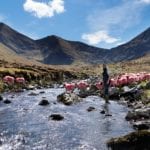 Kieran Doona, comes from a family that have been farming along one of the main access routes to Carrauntoohil for 5 generations. Kieran is a young part-time farmer who is part of the MacGillcuddy Reeks EIP project and works hard to meet their objectives of working with local farmers to maintain and enhance the rare and protected heath and bog through controlled grazing, establishing an active landowner ranger presence, undertaking path maintenance works and treating bracken and rhododendron in the area. He is open to trialling new approaches on his farm. Kieran has significantly reduce sheep numbers on his site to allow the heathers and other heathland vegetation to recover and has also agreed to summer grazing with Droimeann cattle as a long-term management strategy for controlling the total cover of bracken and gorse. Kieran also works with a group of local farmers who carry out path maintenance works in the MacGillycuddy Reeks. This work is vital to the conservation of these upland habitats in terms managing the impacts from the large numbers of people (hillwalkers and other recreational users) that visit the Reeks. Kieran is passionate about raising awareness of upland farming and its long-term viability. More information and a short film on Kieran’s farm here. Ambassador since 2020
Kieran Doona, comes from a family that have been farming along one of the main access routes to Carrauntoohil for 5 generations. Kieran is a young part-time farmer who is part of the MacGillcuddy Reeks EIP project and works hard to meet their objectives of working with local farmers to maintain and enhance the rare and protected heath and bog through controlled grazing, establishing an active landowner ranger presence, undertaking path maintenance works and treating bracken and rhododendron in the area. He is open to trialling new approaches on his farm. Kieran has significantly reduce sheep numbers on his site to allow the heathers and other heathland vegetation to recover and has also agreed to summer grazing with Droimeann cattle as a long-term management strategy for controlling the total cover of bracken and gorse. Kieran also works with a group of local farmers who carry out path maintenance works in the MacGillycuddy Reeks. This work is vital to the conservation of these upland habitats in terms managing the impacts from the large numbers of people (hillwalkers and other recreational users) that visit the Reeks. Kieran is passionate about raising awareness of upland farming and its long-term viability. More information and a short film on Kieran’s farm here. Ambassador since 2020
Kim and Mirielle McCall (Co.Kildare)
Kim and Mireille manage a 214-acre mixed livestock stock farm in Calverstown, Kilcullen, Co. Kildare. They keep a herd of 75 pedigree suckler cows and their followers, a flock of c.80 sheep, as well as a few pigs in the summertime. The farm boasts a wide range of habitats – wetlands, woodlands, wet and dry grasslands, old buildings and walls. Kim acknowledges that farming sustainably isn’t easy, particularly trying to remain profitable, but feels that if you manage the land within its capacity, it’s very doable – ‘farming for nature, not against it’ as he says. No artificial fertilizers are purchased, no pesticides are used and hedgerows and grasslands are rarely topped – ‘tidiness is a state of mind’ according to Kim – with the preferred approach being a careful and balanced management which has resulted in an ideal situation for nature – birds, butterflies, bees – to thrive. The McCalls work in this regard has been recognised by several National awards and several appearances on TV. The McCalls work closely with the National Biodiversity Data Centre, providing valuable data. Kim is concerned about changes in the rural landscape, in particular the loss of wetlands to forestry, as we try to increase carbon sequestration, a potentially worrying trade-off in his opinion. He offers the following advice on farming for nature: ‘Stand back and look – observation is the basis for intelligence’. Here is a leaflet that Kim and his wife Mirielle put together on their farm. View here: Calverstown Farm More information and a short film on Kim and Mirielle’s farm here. Ambassador since 2018
Lisa Gifford (Co. Leitrim)
Lisa Gifford grew up in the U.S., but her Irish roots brought her back to the land in 2016 and she bought a small farm in County Leitrim which she manages with her daughter Gypsy Gifford and daughter-in-law Richelle South. There is a range of stock on the farm including goats, sheep, pigs and chickens. The main commercial aspect of the farm is milking goats and producing farmhouse goats cheese that is sold at local farmers markets. An old farm building has recently been retrofitted and converted into an on-farm micro-dairy. There are mature hedgerows around the farm and the family are planting trees on the land and in field corners to provide shelter and improve soil structure, as well as creating additional habitat for wildlife. More information on Lisa’s farm here. Ambassador since 2023.
Louis McAuley (Co.Meath)
 Louis McAuley and his family manage a 1700-acre farm in county Meath. Approximately 1400 acres of the land is used for cereal production such as winter wheat, winter barley, oilseed rape, beans and oats. All of the cereal grown on the farm goes to their feed mill where they produce animal feed for cattle, sheep and horses. Up until 6 years ago the farm would have been a conventional plough-based tillage system. At that point, they noticed a decline in soil health and crop yields – “The soil is one of our main assets on the farm. We wanted to introduce a system where we were improving our soil year on year, all the while producing crops.” In 2015 a low disturbance direct drilling system was implemented on the farm, meaning the seeds are sown direct into mulch/stubble and there is no ploughing or major soil disturbance which protects the soil biology and structure. They have also included a 6/7-year crop rotation system, as well as utilizing multi-species cover crops on the land to further regenerate the soil. The cover crops that are in the ground during the summer months produce a variety of flowers which attracts insects to the land. The remaining 300 acres of the farm is grassland, and the family run a dairy calf to beef system of around 200 animals. Louis is a founding member of BASE Ireland and he is passionate about educating and encouraging farmers to adopt less-intensive tillage systems. More information on Louis’s farm here. Ambassador since 2021
Louis McAuley and his family manage a 1700-acre farm in county Meath. Approximately 1400 acres of the land is used for cereal production such as winter wheat, winter barley, oilseed rape, beans and oats. All of the cereal grown on the farm goes to their feed mill where they produce animal feed for cattle, sheep and horses. Up until 6 years ago the farm would have been a conventional plough-based tillage system. At that point, they noticed a decline in soil health and crop yields – “The soil is one of our main assets on the farm. We wanted to introduce a system where we were improving our soil year on year, all the while producing crops.” In 2015 a low disturbance direct drilling system was implemented on the farm, meaning the seeds are sown direct into mulch/stubble and there is no ploughing or major soil disturbance which protects the soil biology and structure. They have also included a 6/7-year crop rotation system, as well as utilizing multi-species cover crops on the land to further regenerate the soil. The cover crops that are in the ground during the summer months produce a variety of flowers which attracts insects to the land. The remaining 300 acres of the farm is grassland, and the family run a dairy calf to beef system of around 200 animals. Louis is a founding member of BASE Ireland and he is passionate about educating and encouraging farmers to adopt less-intensive tillage systems. More information on Louis’s farm here. Ambassador since 2021
Luggala Estate (Co. Wicklow)
Michael Keegan is farm manager of Luggala Estate in county Wicklow. The 5000-acre estate was purchased by Luggala Estate Ltd. in 2019 and currently a dedicated team of three full-time staff are undertaking a large restoration project on the land. The estate is a mix of upland blanket bog, dry heath, acid grassland, meadows, mixed woodlands some of which are native and some conifer plantations. There are also two large lakes and two rivers running through the land. The team at Luggala are now implementing an extensive environmental management plan throughout the entire estate. Actions to date include heather cutting, treatment of the invasive Rhododendron plants in the woodland, bruising and treatment of bracken, repair and restoration of the traditional drystone walls, management of deer population, tagging and recording of raptors, gathering seeds from native trees and shrubs on the estate for propagation and woodland restoration and gully planting with native trees and shrubs. There is a small herd of Belted Galloway cattle on the estate who play an important role in conservation grazing and managing vegetation on the land. More information on Luggala here. Ambassador since 2023.
Madeline McKeever & Holly Cairns (Co.Cork)
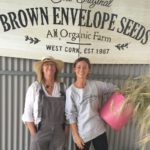 Madeline McKeever runs an organic 30-acre mixed farm in west Cork along with her daughter Holly Cairns. There is 15 acres of broadleaf forestry on the land, containing oak, alder, ash and nut trees. There is 10 acres of permanent mixed pasture and the remaining land is used for seed production and nature corridors. Madeline keeps a small herd of cattle, producing beef for the home and for a few local customers. The cattle are grazed using Voisin’s rational grazing system, meaning the grass is rested for approximately 30 days before being grazed again. A small amount of silage is cut off the land to provide winter feeding for the animals and the animal manure is used to fertilize the land. External inputs on the farm are extremely low. Founder of Brown Envelope Seeds, Madeline is one of only two farms in the country producing vegetable seeds. They produce over 100 varieties of organically certified, open pollinated seed which is sold to Irish growers and gardeners around the country. A wildlife enthusiast all her life, Madeline enjoys seeing an array of birds coming and going to farm, such as choughs, thrushes, chiffchaffs, redwings, fieldfares and lots of other songbirds. The family have planted a diverse range of trees, hedges and fruit bushes on the farm which attract insects like solitary bees, wild honeybees, bumble bees, hoverflies and wasps, all of whom play a crucial role in pollinating the seed crops. Madeleines love of nature is reflected in the low impact, regenerative farming system she runs. More information on Madeline and Holly’s farm here. Ambassadors since 2021
Madeline McKeever runs an organic 30-acre mixed farm in west Cork along with her daughter Holly Cairns. There is 15 acres of broadleaf forestry on the land, containing oak, alder, ash and nut trees. There is 10 acres of permanent mixed pasture and the remaining land is used for seed production and nature corridors. Madeline keeps a small herd of cattle, producing beef for the home and for a few local customers. The cattle are grazed using Voisin’s rational grazing system, meaning the grass is rested for approximately 30 days before being grazed again. A small amount of silage is cut off the land to provide winter feeding for the animals and the animal manure is used to fertilize the land. External inputs on the farm are extremely low. Founder of Brown Envelope Seeds, Madeline is one of only two farms in the country producing vegetable seeds. They produce over 100 varieties of organically certified, open pollinated seed which is sold to Irish growers and gardeners around the country. A wildlife enthusiast all her life, Madeline enjoys seeing an array of birds coming and going to farm, such as choughs, thrushes, chiffchaffs, redwings, fieldfares and lots of other songbirds. The family have planted a diverse range of trees, hedges and fruit bushes on the farm which attract insects like solitary bees, wild honeybees, bumble bees, hoverflies and wasps, all of whom play a crucial role in pollinating the seed crops. Madeleines love of nature is reflected in the low impact, regenerative farming system she runs. More information on Madeline and Holly’s farm here. Ambassadors since 2021
Mariann Klay (Co. Kildare)
Mariann Klay runs a stud farm in Swordlestown Little County Kildare where she breeds thoroughbred horses for the horse-racing industry. The farming system is extensive, and no chemicals are used on the land. Mariann ensures the stocking density is never too high and the land is aerated every year to minimise soil compaction. A nature lover her entire life, Mariann places biodiversity and wildlife at the centre of every decision relating to the land. Thick and mature hedgerows line every field and corridor on the farm. A pond was dug on the land a few years ago and it has become a central point on the farm, attracting an abundance of insects and birds. There is steam on the land which provides further water habitat and there is an area of wetland on the farm as well. There are pockets of mature woodland throughout the farm which provides a habitat for the diverse array of wildlife that lives on the farm. More information on Mariann’s farm here. Ambassador since 2o23.
Mark and Alison Hurst (Co.Kildare)
Mark and Alison Hurst run the 70-acre Featherfield farm with their farm manager, Julian Laitenberger in Lullymore, Co.Kildare. The farm is very diverse with enterprises such as beef production with Dexter cattle, a small sheep enterprise, a poultry layer and as well as a collection of rare breed poultry. There is also a small vegetable and fruit growing as well as a beekeeping enterprise. They sell direct to customer and have an education centre as they are keen to encourage others to grow and produce food in a sustainable manner. “We are just visitors on this land, and strive to leave it better than we found it for nature…whilst making an income” More information and a short film on Mark and Alison’s farm here. Ambassador since 2019
Mark Gillanders (Co.Monaghan)
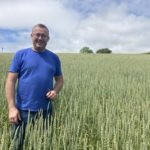 Mark Gillanders runs a mixed organic farm in County Monaghan. About 75 acres of cereals are grown on the farm and the remainder of the land is permanent pasture and clover/multispecies pasture. Mark runs a suckler herd of about 20 cattle and the stock are very extensively managed. Red clover silage produces winter feeding for the cattle who are indoors for just a few weeks over the winter months. Organic oats are grown and supplied to Flahavans. Organic wheat is grown on the farm and is locally milled into strong Irish flour and sold in the Irish consumer market. Mark has incorporated rotational combi crops into the farming system, mainly wheat and beans growing together, which are separated leaving the wheat for flour and the beans for animal protein, thus reducing the amount of imported protein. There is about 5 acres of uncultivated wetland on the farm which is left for biodiversity and wildlife. Thick hedgerows are managed for biodiversity and along with pockets of woodland they make up nature corridors running throughout the farm. Since converting to organic in 2009, Mark has observed a significant increase biodiversity on the land – “The farm has improved tremendously in terms of biodiversity on the land, as well as climate and economic resilience.” Mark has an MSc in Organic Farming from Scotland’s Rural College in 2019. He is proud to run a farm that produces high quality food for human consumption as well as providing for local wildlife and biodiversity. More information on Mark’s farm and view a short video here. Ambassador since 2022
Mark Gillanders runs a mixed organic farm in County Monaghan. About 75 acres of cereals are grown on the farm and the remainder of the land is permanent pasture and clover/multispecies pasture. Mark runs a suckler herd of about 20 cattle and the stock are very extensively managed. Red clover silage produces winter feeding for the cattle who are indoors for just a few weeks over the winter months. Organic oats are grown and supplied to Flahavans. Organic wheat is grown on the farm and is locally milled into strong Irish flour and sold in the Irish consumer market. Mark has incorporated rotational combi crops into the farming system, mainly wheat and beans growing together, which are separated leaving the wheat for flour and the beans for animal protein, thus reducing the amount of imported protein. There is about 5 acres of uncultivated wetland on the farm which is left for biodiversity and wildlife. Thick hedgerows are managed for biodiversity and along with pockets of woodland they make up nature corridors running throughout the farm. Since converting to organic in 2009, Mark has observed a significant increase biodiversity on the land – “The farm has improved tremendously in terms of biodiversity on the land, as well as climate and economic resilience.” Mark has an MSc in Organic Farming from Scotland’s Rural College in 2019. He is proud to run a farm that produces high quality food for human consumption as well as providing for local wildlife and biodiversity. More information on Mark’s farm and view a short video here. Ambassador since 2022
Mark Harold-Barry (Co.Tipperary)
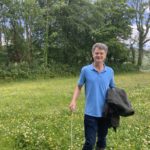 Mark Harold-Barry runs a mixed organic farm outside Tipperary Town. The 170-acre farm has been certified organic for almost 20 years. Mark grows organic oats for Flahavans and for winter feeding for his stock, he also grows seed oats for Gold Crop. There is about 90 acres of grassland on the farm, which is a mixture of permanent pasture and multispecies swards. Mark keeps a suckler herd of about 25 Aberdeen Angus/Hereford cattle and all of the animals are finished on the farm. He also keeps about 20 hives of honeybees, and the honey is sold locally in Tipperary. The family manage a kitchen garden on the farm and are relatively self-sufficient during the summer months. The farm is extensively managed and external inputs are minimal. There is about 40acres of woodland on the farm – a mix of hardwood and softwood trees, some very mature and some much younger. Mark follows in this father’s footsteps and continuously plants trees on the land – “My father is a great man and he has a policy of planting about half an acre of trees on the farm every year since he came here.” The woodland provides a wonderful habitat for wildlife. There is a river running through the farm and a pond on the land which attract birds such as the kingfisher, ducks and snipe. Ditches, hedgerows and field margins provide thick nature corridors throughout the land. Mark is proud to run a productive farm, all the while leaving plenty of space for wildlife and biodiversity to thrive. More information on Mark’s farm and view a short video here. Ambassador since 2022
Mark Harold-Barry runs a mixed organic farm outside Tipperary Town. The 170-acre farm has been certified organic for almost 20 years. Mark grows organic oats for Flahavans and for winter feeding for his stock, he also grows seed oats for Gold Crop. There is about 90 acres of grassland on the farm, which is a mixture of permanent pasture and multispecies swards. Mark keeps a suckler herd of about 25 Aberdeen Angus/Hereford cattle and all of the animals are finished on the farm. He also keeps about 20 hives of honeybees, and the honey is sold locally in Tipperary. The family manage a kitchen garden on the farm and are relatively self-sufficient during the summer months. The farm is extensively managed and external inputs are minimal. There is about 40acres of woodland on the farm – a mix of hardwood and softwood trees, some very mature and some much younger. Mark follows in this father’s footsteps and continuously plants trees on the land – “My father is a great man and he has a policy of planting about half an acre of trees on the farm every year since he came here.” The woodland provides a wonderful habitat for wildlife. There is a river running through the farm and a pond on the land which attract birds such as the kingfisher, ducks and snipe. Ditches, hedgerows and field margins provide thick nature corridors throughout the land. Mark is proud to run a productive farm, all the while leaving plenty of space for wildlife and biodiversity to thrive. More information on Mark’s farm and view a short video here. Ambassador since 2022
Maurice Deasy (Co.Tipperary)
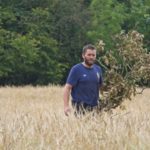 Maurice Deasy farms in partnership with his father Ruaidhri in northwest Tipperary. The 120-acre mixed farm is a sheep and tillage operation. Crops grown include winter barley and oats, spring barley, malting barley and beans. In recent years these farmers have been implementing the principles of conservation agriculture on their land – direct drilling, crop rotation and cover cropping. This work is being done to regenerate and protect the soil biology. Maurice has been growing heritage Irish grains to preserve their genetic diversity and maintain their heritage. While these grains are lower yielding, their larger root systems provide crucial disease and drought resistance. “The heritage grains give a better flavour to the finished beer product. I have found they also have higher disease resistance.” The heritage grains are processed and malted on-site and made into a single-source farmhouse beer. Maurice is also experimenting with biological seed coatings made from biochar and seaweed to reduce inputs and adopt more natural farming processes. There are 80 breeding ewes on the farm. Some of the grassland is permanent pasture and Maurice is reseeding some of the pasture with multispecies swards. There is approximately 20 acres of mixed woodland on the farm which attracts lots of birds to the land. Hedgerows are managed for biodiversity and act as nature corridors running throughout the land. There is an area of wet/boggy land which has been fenced off and left for biodiversity. A river runs through the farm and there is a pond on the land. On the farm there are deer, woodcock, snipe, pheasant, kingfisher and otter. More information on Maurice’s farm here. Ambassador since 2022
Maurice Deasy farms in partnership with his father Ruaidhri in northwest Tipperary. The 120-acre mixed farm is a sheep and tillage operation. Crops grown include winter barley and oats, spring barley, malting barley and beans. In recent years these farmers have been implementing the principles of conservation agriculture on their land – direct drilling, crop rotation and cover cropping. This work is being done to regenerate and protect the soil biology. Maurice has been growing heritage Irish grains to preserve their genetic diversity and maintain their heritage. While these grains are lower yielding, their larger root systems provide crucial disease and drought resistance. “The heritage grains give a better flavour to the finished beer product. I have found they also have higher disease resistance.” The heritage grains are processed and malted on-site and made into a single-source farmhouse beer. Maurice is also experimenting with biological seed coatings made from biochar and seaweed to reduce inputs and adopt more natural farming processes. There are 80 breeding ewes on the farm. Some of the grassland is permanent pasture and Maurice is reseeding some of the pasture with multispecies swards. There is approximately 20 acres of mixed woodland on the farm which attracts lots of birds to the land. Hedgerows are managed for biodiversity and act as nature corridors running throughout the land. There is an area of wet/boggy land which has been fenced off and left for biodiversity. A river runs through the farm and there is a pond on the land. On the farm there are deer, woodcock, snipe, pheasant, kingfisher and otter. More information on Maurice’s farm here. Ambassador since 2022
McDonagh Family (Co.Mayo)
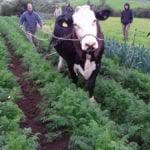 The McDonagh family run an organic mixed farm in county Mayo. They keep cows, sheep, pigs, ducks and hens. They grow 2 acres of organic root vegetables which are sold locally. They have planted over 8 acres of mixed broadleaf forestry on the land. The mature hedgerows and field boundaries are left to grow naturally and serve as important habitats for birds and other wildlife. They continue to plant trees on the farm every year. Relying on very few external inputs, the family have built a farm that is highly self-sufficient and resilient to environmental and economic shocks. The grazing paddocks contain a diverse mix of grasses and herbs. The animals provide manure which is a crucial source of fertility for the vegetable beds. They use green manures to naturally increase the nitrogen content of the soil where the vegetables are grown. Eamonn has worked with draft horses and more recently with oxen to work the land. The draft animals are used to carry out many of the farm tasks – from harvesting trees from the wooded part of the farm to harrowing vegetable beds. The McDonagh’s have hosted farm walks on the farm for Slow Food Ireland and the Small Growers Network. “This farm is a testament to what can be achieved when a love of nature is coupled with a passion for local, sustainable food and when diversification is championed over specialisation.” More information on the McDonagh’s farm here. Ambassador since 2022
The McDonagh family run an organic mixed farm in county Mayo. They keep cows, sheep, pigs, ducks and hens. They grow 2 acres of organic root vegetables which are sold locally. They have planted over 8 acres of mixed broadleaf forestry on the land. The mature hedgerows and field boundaries are left to grow naturally and serve as important habitats for birds and other wildlife. They continue to plant trees on the farm every year. Relying on very few external inputs, the family have built a farm that is highly self-sufficient and resilient to environmental and economic shocks. The grazing paddocks contain a diverse mix of grasses and herbs. The animals provide manure which is a crucial source of fertility for the vegetable beds. They use green manures to naturally increase the nitrogen content of the soil where the vegetables are grown. Eamonn has worked with draft horses and more recently with oxen to work the land. The draft animals are used to carry out many of the farm tasks – from harvesting trees from the wooded part of the farm to harrowing vegetable beds. The McDonagh’s have hosted farm walks on the farm for Slow Food Ireland and the Small Growers Network. “This farm is a testament to what can be achieved when a love of nature is coupled with a passion for local, sustainable food and when diversification is championed over specialisation.” More information on the McDonagh’s farm here. Ambassador since 2022
Mervyn Auchmuty (Co.Roscommon)
Mervyn manages a 500-acre mixed cattle and tillage farm with his father along the shore of Lough Ree, Co.Roscommon. The farm uses a low disturbance strip till system to protect soil structure, increase earthworms, reduce leaching and prevent soil erosion. They use cover crops which are then mulched on top of the soil as a green manure. Additionally, slurry has been spread using a low-emission system for the last 10 years in intensively farmed areas of their land. Mervyn’s is a good example of a farm that is making the transition from intensive methods of spraying to working with nature whilst not effecting the yield. “The earthworm has gone up four times since I stopped ploughing”. More information and a short film on Mervyn’s farm here. Ambassador since 2019
Michael Hickey (Co.Tipperary)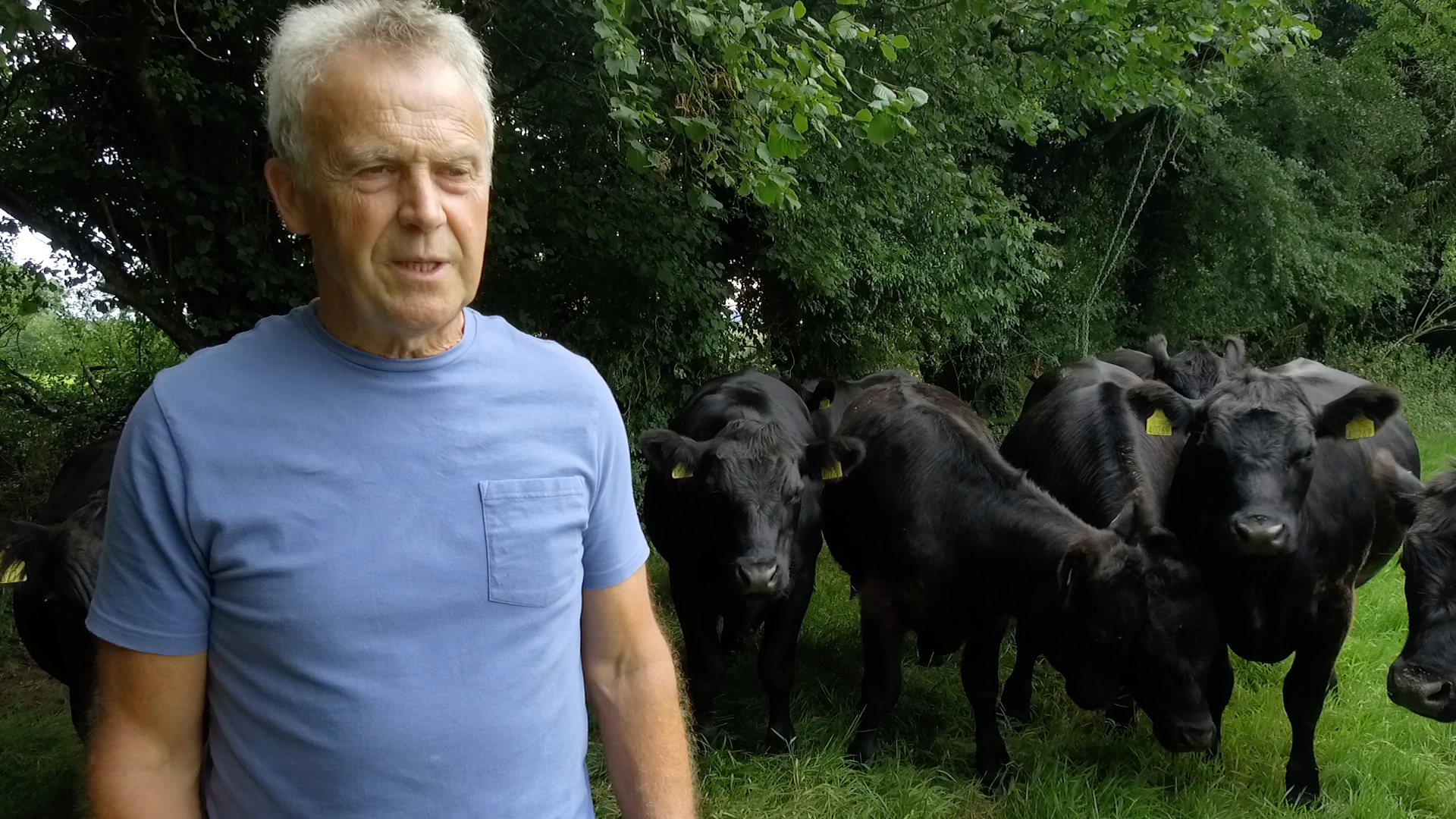
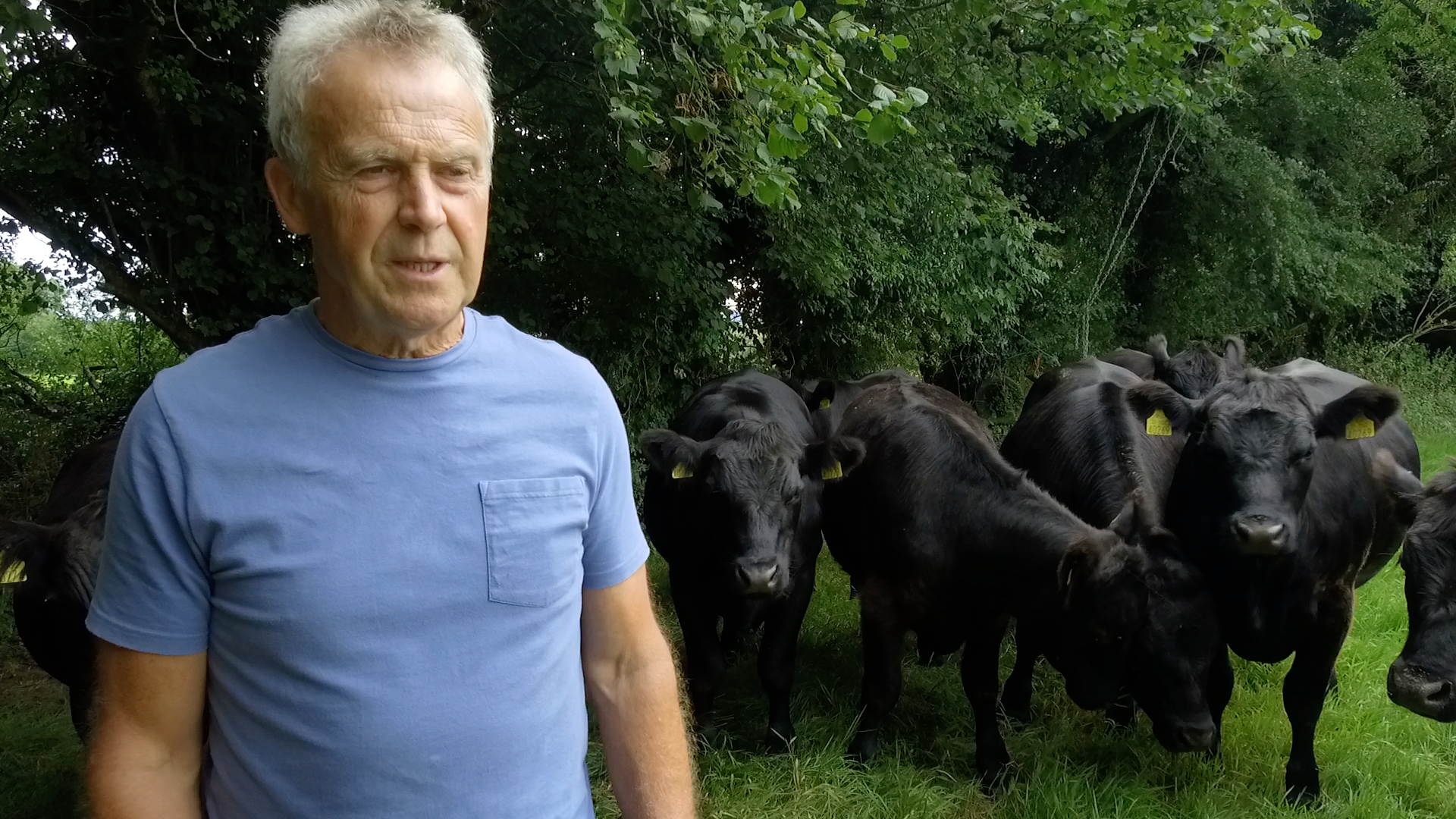
Michael runs a 100-acre organic farm in New Inn, Co.Tipperary where he manages half the farm for tillage and the rest for his herd of 40 Aberdeen Angus and horses. The farm has a variety of habitats including seasonally flooded grasslands, fen areas, pastures and meadows. Michael manages his field boundaries as habitats and is a good example of someone who has spent the time looking to see what management practices best suits each habitat to give the most for biodiversity. “I have given 30% of my farm over to habitats” Michael is trying a number of different multi seed mixes, both solo and over seeding. He enjoys being a mentor on The Horse’s Mouth mentorship programme. More information and a short film on Michael’s farm here. Ambassador since 2019
Michael McManus (Co.Leitrim)
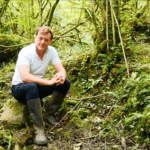 Michael McManus hails from county Leitrim where he farms a suckler herd over 180 acres. The organic farm is comprised of 3 distinct areas. The first is described as ‘rocky outcrop’ land, the second is ‘sandy loam’ land and the third he describes as a ‘shale type’ land. All three of these distinct areas contain their own rich variety of grasses and vegetation. Michael operates a rotational grazing system, whereby the animals are moved from one area to the next throughout the year. They are moved in accordance with the stage of growth they are at or whether they have calves on them at the time – “I firmly believe that having different plant types for cattle to graze on provides them with a wide range of minerals and nutrients. I think cattle have natural curiosity that needs to be satisfied – they enjoy grazing different areas that have different types of vegetation.” The natural meadows have not been reseeded and provide great biodiversity on the farm. “The grazing of this type of land with cattle helps promote the natural vegetation here. The only management of the land is the cattle grazing, then letting the grasses and flowers grow (buttercup, rushes, meadowsweet and so on) then cutting the meadow for hay/silage later in the summer.” The cattle overwinter outdoors where they are supplemented with some meal and hay/silage. Michael is interested in agroforestry, permaculture and preserving traditional methods of farming. He values nature, heritage and biodiversity on his farm. “Our ethos around having an ecotourism business is for the benefit and sustainability of our family farm without spoiling nature’s natural resources that already prevail here on the farm. We recognise our ancient ecosystem is not just our farming history but is our farming future.” More information on Michael’s farm here. Ambassador since 2021
Michael McManus hails from county Leitrim where he farms a suckler herd over 180 acres. The organic farm is comprised of 3 distinct areas. The first is described as ‘rocky outcrop’ land, the second is ‘sandy loam’ land and the third he describes as a ‘shale type’ land. All three of these distinct areas contain their own rich variety of grasses and vegetation. Michael operates a rotational grazing system, whereby the animals are moved from one area to the next throughout the year. They are moved in accordance with the stage of growth they are at or whether they have calves on them at the time – “I firmly believe that having different plant types for cattle to graze on provides them with a wide range of minerals and nutrients. I think cattle have natural curiosity that needs to be satisfied – they enjoy grazing different areas that have different types of vegetation.” The natural meadows have not been reseeded and provide great biodiversity on the farm. “The grazing of this type of land with cattle helps promote the natural vegetation here. The only management of the land is the cattle grazing, then letting the grasses and flowers grow (buttercup, rushes, meadowsweet and so on) then cutting the meadow for hay/silage later in the summer.” The cattle overwinter outdoors where they are supplemented with some meal and hay/silage. Michael is interested in agroforestry, permaculture and preserving traditional methods of farming. He values nature, heritage and biodiversity on his farm. “Our ethos around having an ecotourism business is for the benefit and sustainability of our family farm without spoiling nature’s natural resources that already prevail here on the farm. We recognise our ancient ecosystem is not just our farming history but is our farming future.” More information on Michael’s farm here. Ambassador since 2021
Mimi & Owen Crawford (Co.Tipperary)
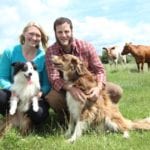 Mimi and Owen Crawford operate Crawford’s Farm. Theirs is a small traditional Irish working farm, comprising of twenty-eight acres in Cloughjordan, Co. Tipperary. It is certified organic where they milk about 10-12 cows, keep 15-16 pigs a year, roughly 1000 broilers and 30-40 ducks. It is a very holistic approach of mixed stock and they believe in diversity in income streams, markets and retailers. The husband and wife duo focus largely on their micro-dairy, with pedigree Irish Shorthorn cows dominating the pastures producing raw cream, raw butter and raw buttermilk, with all processes completed on-farm. Aside from the dairy aspect, they also engage in beef production with the weanlings with 100% grass-raised beef. They raise organic broiler chickens that follow behind the cows in the grazing rotation, have organic ducks for slug control, organic pigs to assist them to consume excess skim milk. Their traditional working farm incorporates a modern-day approach that works in harmony with nature. They believe farming should be diverse as nature. It is an ecosystem as well that is mutually beneficial and the products speak for themselves. They feel their consumer like to buying into the whole process, the story of the farm and they are completely transparent in delivering this. “We believe Ireland has the opportunity to produce good clean food and we want to be part of that and help others realise that opportunity as well”. More information on the Crawfords’ farm here. Ambassadors since 2020
Mimi and Owen Crawford operate Crawford’s Farm. Theirs is a small traditional Irish working farm, comprising of twenty-eight acres in Cloughjordan, Co. Tipperary. It is certified organic where they milk about 10-12 cows, keep 15-16 pigs a year, roughly 1000 broilers and 30-40 ducks. It is a very holistic approach of mixed stock and they believe in diversity in income streams, markets and retailers. The husband and wife duo focus largely on their micro-dairy, with pedigree Irish Shorthorn cows dominating the pastures producing raw cream, raw butter and raw buttermilk, with all processes completed on-farm. Aside from the dairy aspect, they also engage in beef production with the weanlings with 100% grass-raised beef. They raise organic broiler chickens that follow behind the cows in the grazing rotation, have organic ducks for slug control, organic pigs to assist them to consume excess skim milk. Their traditional working farm incorporates a modern-day approach that works in harmony with nature. They believe farming should be diverse as nature. It is an ecosystem as well that is mutually beneficial and the products speak for themselves. They feel their consumer like to buying into the whole process, the story of the farm and they are completely transparent in delivering this. “We believe Ireland has the opportunity to produce good clean food and we want to be part of that and help others realise that opportunity as well”. More information on the Crawfords’ farm here. Ambassadors since 2020
Muller Family (Co.Clare)
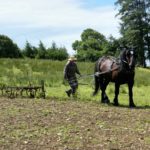 Mona and Harry Muller, along with their four children, farm 38.5 hectares of wet grassland in the Slieve Aughty Mountains in Co.Clare. The family farm is situated in a Hen Harrier Special Protected Area and they are members of the Hen Harrier programme since 2018. “The areas of wetland on the farm provide great biodiversity, but the land needs farming in a very sensitive way.” The farm is certified organic and guided by biodynamic principles. On the farm there are horses, goats, sheep, cattle, hens, ducks, turkeys and bees. The animals play an important role in grazing the natural mountain vegetation and providing fertilizer for soil regeneration. Meat, eggs, milk, yogurt and cheese is sold direct to the local community via a small on-site farm shop. There is a horticulture enterprise on the farm as well – organic vegetables are sold direct to local customers and the Mullers grow heritage vegetable seeds for Irish Seed Savers. External inputs on the farm are extremely low. Fodder crops and cereals are grown on the land to provide winter feed for the animals. The Mullers use draft horses to plough the land in place of machinery where possible. The family have worked hard to create a self-sufficient farm that is ecologically and economically viable. “We see our farm as an organism. Where all the different animals and all the different enterprises interlink and support each other and work with each other.” More information on the Mullers’ farm here. Ambassador since 2021
Mona and Harry Muller, along with their four children, farm 38.5 hectares of wet grassland in the Slieve Aughty Mountains in Co.Clare. The family farm is situated in a Hen Harrier Special Protected Area and they are members of the Hen Harrier programme since 2018. “The areas of wetland on the farm provide great biodiversity, but the land needs farming in a very sensitive way.” The farm is certified organic and guided by biodynamic principles. On the farm there are horses, goats, sheep, cattle, hens, ducks, turkeys and bees. The animals play an important role in grazing the natural mountain vegetation and providing fertilizer for soil regeneration. Meat, eggs, milk, yogurt and cheese is sold direct to the local community via a small on-site farm shop. There is a horticulture enterprise on the farm as well – organic vegetables are sold direct to local customers and the Mullers grow heritage vegetable seeds for Irish Seed Savers. External inputs on the farm are extremely low. Fodder crops and cereals are grown on the land to provide winter feed for the animals. The Mullers use draft horses to plough the land in place of machinery where possible. The family have worked hard to create a self-sufficient farm that is ecologically and economically viable. “We see our farm as an organism. Where all the different animals and all the different enterprises interlink and support each other and work with each other.” More information on the Mullers’ farm here. Ambassador since 2021
Nia O’ Malley (Co.Galway)
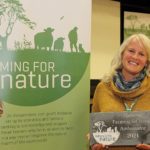 Nia O Malley farms 60 hectares in the Slieve Aughty Mountains in Co. Galway. She took over the family farm in 2010. Since then, she has worked incredibly hard to rebuild and regenerate the farm and has done so with respect and consideration for the natural landscape and wildlife of the area. “Something you learn as a hill farmer is you have to adapt to the area – you can’t just come in and change things as you wish… You have to adapt to the land and work with the land, rather than forcing the land to adapt to your farming practices.” Farming in a hen harrier Special Protected Area, Nia joined the Hen Harrier programme in 2018 where she was involved in a mountain grazing project. The trial focused on increasing cattle grazing on areas of bog/heath that are dominated by Molinia grasses and pose serious fire risks. “My involvement with the hen harrier project enabled me to look at my land differently and value what I might not have valued before… The more you graze commonage, the more you will reduce the Molina grass growth and the more you will encourage other grass species to come up. This will eventually extend the grazing season on the mountain.” Interested in silvopasture and agroforestry, Nia has planted hedgerows and areas of native woodland around the farm. More information and a film on Nia’s farm here. Ambassador since 2021
Nia O Malley farms 60 hectares in the Slieve Aughty Mountains in Co. Galway. She took over the family farm in 2010. Since then, she has worked incredibly hard to rebuild and regenerate the farm and has done so with respect and consideration for the natural landscape and wildlife of the area. “Something you learn as a hill farmer is you have to adapt to the area – you can’t just come in and change things as you wish… You have to adapt to the land and work with the land, rather than forcing the land to adapt to your farming practices.” Farming in a hen harrier Special Protected Area, Nia joined the Hen Harrier programme in 2018 where she was involved in a mountain grazing project. The trial focused on increasing cattle grazing on areas of bog/heath that are dominated by Molinia grasses and pose serious fire risks. “My involvement with the hen harrier project enabled me to look at my land differently and value what I might not have valued before… The more you graze commonage, the more you will reduce the Molina grass growth and the more you will encourage other grass species to come up. This will eventually extend the grazing season on the mountain.” Interested in silvopasture and agroforestry, Nia has planted hedgerows and areas of native woodland around the farm. More information and a film on Nia’s farm here. Ambassador since 2021
Nicolas Redmond (Co.Wexford)
 Nicholas Redmond is a mixed stock organic farmer from north county Wexford. He farms sheep and Dexter cattle. There are also chickens, donkeys and alpacas on the farm. Approximately 18 acres of the land is under forestry – some an old-growth Oak forest and the rest a mixed broadleaf forest. There is an orchard on the farm and the family grow a variety of fruits and vegetables for the home. Nicholas operates an extensive farming system and very few external inputs are used on the farm – no chemical fertilizer, no concentrates and minimal machinery. The pasture on the farm is species-rich grassland. The animals are part of a mixed rotational grazing system. Part of the farm is comprised of a 4-acre traditional hay meadow. This pasture is extremely species-rich and full of native Irish wildflowers and grasses. Nicholas is working with Irish Wildflowers to harvest seed every year from the meadow. These seeds are then redistributed to other farms/areas around the country, helping to ensure the vitality of these species. The variety of different plants and trees around the land make it extremely biodiverse as well as attracting much wildlife. On the farm there are numerous birds such as buzzards, jaybirds, woodpeckers, wrens, robins, finches, blackbirds and thrushes. There are also foxes, badgers, grey squirrel and hedgehogs. Nicholas is passionate about nature conservation and a firm believer that farming activities should not impact in a negative way on the land – “I would see myself as more of a nature warden who is also a farmer.” More information on Nicholas’s farm here. Ambassador since 2021
Nicholas Redmond is a mixed stock organic farmer from north county Wexford. He farms sheep and Dexter cattle. There are also chickens, donkeys and alpacas on the farm. Approximately 18 acres of the land is under forestry – some an old-growth Oak forest and the rest a mixed broadleaf forest. There is an orchard on the farm and the family grow a variety of fruits and vegetables for the home. Nicholas operates an extensive farming system and very few external inputs are used on the farm – no chemical fertilizer, no concentrates and minimal machinery. The pasture on the farm is species-rich grassland. The animals are part of a mixed rotational grazing system. Part of the farm is comprised of a 4-acre traditional hay meadow. This pasture is extremely species-rich and full of native Irish wildflowers and grasses. Nicholas is working with Irish Wildflowers to harvest seed every year from the meadow. These seeds are then redistributed to other farms/areas around the country, helping to ensure the vitality of these species. The variety of different plants and trees around the land make it extremely biodiverse as well as attracting much wildlife. On the farm there are numerous birds such as buzzards, jaybirds, woodpeckers, wrens, robins, finches, blackbirds and thrushes. There are also foxes, badgers, grey squirrel and hedgehogs. Nicholas is passionate about nature conservation and a firm believer that farming activities should not impact in a negative way on the land – “I would see myself as more of a nature warden who is also a farmer.” More information on Nicholas’s farm here. Ambassador since 2021
Noel Kiernan (Co.Longford)
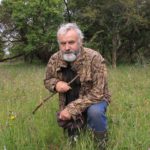 Noel Kiernan farms 250 acres of mixed land – there is forestry, marsh, bogland, pasture and hay meadows. He is passionate about conservation in all forms – from native flora and fauna, to native Irish livestock breeds. He farms and breeds from Roscommon sheep and Bo Riacht cattle – playing a crucial role in ensuring the vitality of these old Irish breeds. The animals are a crucial element of Noels farming system as they graze the pasture and produce manure which fertilizes the soil – “Grazing is very important for certain rare species, such as curlew, corncrake, lapwing, skylark and other ground nesting birds, as well as flora like orchids. All those species have followed us as farmers through the ages and they have benefited from our farming activity. Now, the lack of that type of traditional farming activity means that many of those species will be in trouble because they won’t have suitable habitats.” Noel is a forester as well as a farmer and he is passionate about combining forestry and farming. There is 100 acres of native broadleaf forestry on the land and Noel runs a continuous forest cover system. The farm, also referred to as “Noel’s Ark”, holds an impressive array of habitats and wildlife, including but not limited to amphibians, lizards, pine martens, kingfishers, woodcocks, blackcaps, skylarks, marsh fritillary butterflies and various bee species. For years, Noel has dedicated his time and his land to farming in ways that protect and enhance biodiversity – “my farm is open to whatever birds want to come in.” More information and a film on Noel’s farm here. Ambassador since 2021
Noel Kiernan farms 250 acres of mixed land – there is forestry, marsh, bogland, pasture and hay meadows. He is passionate about conservation in all forms – from native flora and fauna, to native Irish livestock breeds. He farms and breeds from Roscommon sheep and Bo Riacht cattle – playing a crucial role in ensuring the vitality of these old Irish breeds. The animals are a crucial element of Noels farming system as they graze the pasture and produce manure which fertilizes the soil – “Grazing is very important for certain rare species, such as curlew, corncrake, lapwing, skylark and other ground nesting birds, as well as flora like orchids. All those species have followed us as farmers through the ages and they have benefited from our farming activity. Now, the lack of that type of traditional farming activity means that many of those species will be in trouble because they won’t have suitable habitats.” Noel is a forester as well as a farmer and he is passionate about combining forestry and farming. There is 100 acres of native broadleaf forestry on the land and Noel runs a continuous forest cover system. The farm, also referred to as “Noel’s Ark”, holds an impressive array of habitats and wildlife, including but not limited to amphibians, lizards, pine martens, kingfishers, woodcocks, blackcaps, skylarks, marsh fritillary butterflies and various bee species. For years, Noel has dedicated his time and his land to farming in ways that protect and enhance biodiversity – “my farm is open to whatever birds want to come in.” More information and a film on Noel’s farm here. Ambassador since 2021
Norman and Michael Dunne (Co.Kildare)
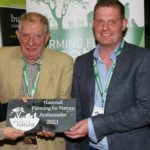 Norman Dunne along with his father Michael Dunne, run a 400-acre tillage farm outside Maynooth, Co. Kildare. The land has been under intensive tillage production for years. About four years ago Norman and his father decided it was time to move away from conventional, intensive tillage and implement a regenerative farming system operating under the principles of conservation agriculture. Cereals grown on the farm include beans, oats, barley and wheat for the animal feed market. Norman also produces hay for the equine market. Participants of the Danú EIP Project and members of BASE Ireland, the focus has been on regenerating soil biology and reducing external inputs where possible on the farm. Cereal crops are grown on the land using minimal disturbance methods like direct drilling and/or min-till. Crop rotations and permanent organic soil cover systems are in place. Additionally, multi-species cover crops are used to build soil fertility and enhance soil structure, all the while providing a food source for pollinating insects. Norman is also experimenting with Biodynamic preparations and Korean Natural Farming methods to enhance the soil biology and to inoculate seeds before sowing. Since the reintroduction of regenerative farming methods on the land, there has been a significant increase in biodiversity and a return of numerous bird species to the farm – “Biodiversity has exploded on the land here in the past 3 or 4 years”. Norman and Michael have enjoyed seeing the return of barn owls, skylarks, sparrowhawks, kestrels, buzzards, woodpeckers, wood pigeons, lapwings, yellowhammers and more. More information and a film on Dunnes’ farm here. Ambassador since 2021
Norman Dunne along with his father Michael Dunne, run a 400-acre tillage farm outside Maynooth, Co. Kildare. The land has been under intensive tillage production for years. About four years ago Norman and his father decided it was time to move away from conventional, intensive tillage and implement a regenerative farming system operating under the principles of conservation agriculture. Cereals grown on the farm include beans, oats, barley and wheat for the animal feed market. Norman also produces hay for the equine market. Participants of the Danú EIP Project and members of BASE Ireland, the focus has been on regenerating soil biology and reducing external inputs where possible on the farm. Cereal crops are grown on the land using minimal disturbance methods like direct drilling and/or min-till. Crop rotations and permanent organic soil cover systems are in place. Additionally, multi-species cover crops are used to build soil fertility and enhance soil structure, all the while providing a food source for pollinating insects. Norman is also experimenting with Biodynamic preparations and Korean Natural Farming methods to enhance the soil biology and to inoculate seeds before sowing. Since the reintroduction of regenerative farming methods on the land, there has been a significant increase in biodiversity and a return of numerous bird species to the farm – “Biodiversity has exploded on the land here in the past 3 or 4 years”. Norman and Michael have enjoyed seeing the return of barn owls, skylarks, sparrowhawks, kestrels, buzzards, woodpeckers, wood pigeons, lapwings, yellowhammers and more. More information and a film on Dunnes’ farm here. Ambassador since 2021
Oliver Nagle (Co.Clare)
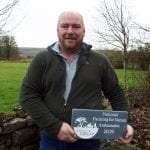 Oliver and his family farm 121 acres of winterage, meadow and pasture on the Burren at Slieve Carran, Co. Clare. He has been involved in the Burren Programme since it began and manages his land in a way that exemplifies farming for nature. Oliver has done a variety of conservation actions on the farm, including restoring old field systems and protecting natural springs. He is passionate about nature and shares his knowledge freely with the next generation through farm walks with Botany students from NUIG. In doing this, he is spreading a real understanding of what it means to farm for nature among the next generation. Oliver won the national ‘Farming Together with Biodiversity’ award in recognition for his efforts in conservation farming in February 2019. More information and a short film on Oliver’s farm here. Ambassador since 2019
Oliver and his family farm 121 acres of winterage, meadow and pasture on the Burren at Slieve Carran, Co. Clare. He has been involved in the Burren Programme since it began and manages his land in a way that exemplifies farming for nature. Oliver has done a variety of conservation actions on the farm, including restoring old field systems and protecting natural springs. He is passionate about nature and shares his knowledge freely with the next generation through farm walks with Botany students from NUIG. In doing this, he is spreading a real understanding of what it means to farm for nature among the next generation. Oliver won the national ‘Farming Together with Biodiversity’ award in recognition for his efforts in conservation farming in February 2019. More information and a short film on Oliver’s farm here. Ambassador since 2019
Olly Nolan (Co.Dublin)
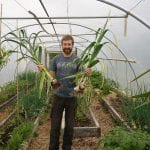 Olly started his 8.5 acre farm in 2012 and since then has been developing it into a self-sufficient farm with nature and wildlife in mind. He has planted over 1600 native trees. He has converted a disused sand arena into an organic vegetable garden, planted with over 60 fruit trees, mainly traditional ones, and keeps a small herd of Irish Dexters and a couple of rare breed pigsand keep rare breed animals from their small herd of Irish Dexters to a couple of rare breed pigs for the freezer. Although not organically certified, the farm is run organically, recycling everything and producing its own compost and mulches. Olly keeps a large number of beehives around Dublin/ Wicklow mountains, helping to pollinate the heather on Wicklow Mountains National Park. His ‘honey house’ is completely powered by solar panels. He harvests rain water from all the buildings to use in the veg garden and water the animals so as not to take too much ground water from the well. He makes his own hay or silage and never cuts before July to allow nesting birds a chance to rear their young. More information and a short film on Olly’s farm here. Ambassador since 2019
Olly started his 8.5 acre farm in 2012 and since then has been developing it into a self-sufficient farm with nature and wildlife in mind. He has planted over 1600 native trees. He has converted a disused sand arena into an organic vegetable garden, planted with over 60 fruit trees, mainly traditional ones, and keeps a small herd of Irish Dexters and a couple of rare breed pigsand keep rare breed animals from their small herd of Irish Dexters to a couple of rare breed pigs for the freezer. Although not organically certified, the farm is run organically, recycling everything and producing its own compost and mulches. Olly keeps a large number of beehives around Dublin/ Wicklow mountains, helping to pollinate the heather on Wicklow Mountains National Park. His ‘honey house’ is completely powered by solar panels. He harvests rain water from all the buildings to use in the veg garden and water the animals so as not to take too much ground water from the well. He makes his own hay or silage and never cuts before July to allow nesting birds a chance to rear their young. More information and a short film on Olly’s farm here. Ambassador since 2019
Padraig Corcoran (Co.Roscommon)
Padraig has a cattle and sheep enterprise on their holding in Mount Plunkett, near Lough Ree, Co. Roscommon. Padraic manages this 54-acre section of an old estate – which he and his family run as a Nature Reserve – composed of diverse range of tillage, grassland, woodland and wetland. He has restored woodland, planted new hedgerows, dug ponds, installed bat and bird boxes and restored wetland areas for breeding waders of conservation importance by clearing encroaching scrub. He has established plots for wild birds and used seed mixes that are optimum for biodiversity. Padraig is very knowledgeable and keen to advocate for getting the best for biodiversity from his landscape. “We don’t do anything special, just care for what’s there. Farming is about being sensitive and compassionate to the environment that we are working in’. More information and a short film on Padraig’s farm here. Ambassador since 2018
Pádraic Ó Flaithearta (Co.Galway)
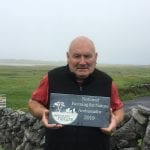 Pádraic Ó Flaithearta runs a small suckler farm on Inis Mór, Co. Galway. The farm is predominantly composed of orchid-rich calcareous grasslands and machair, two priority habitats under the EU Habitats Directive, as a result 51.78ha of his 55ha holding is designated as a Special Area of Conservation. Pádraic’s management is responsible for the conservation of some of the best examples of calcareous grassland in Ireland. The machair is home to a significant number of breeding lapwings as well as three species of terns, plover, wheatear and skylarks – Pádraic managed his grazing regime to minimise disturbance he also actively monitors the populations of these bird species as well as the negative influences such as predation by hooded crows and overgrazing by rabbits. Pádraic manages the species-rich grassland to maximise species diversity addressing the many negative influences that can reduce species diversity, this includes active scrub control, targeted grazing and minimising nutrient input. More information and a short film on Pádraic’s farm here. Ambassador since 2019
Pádraic Ó Flaithearta runs a small suckler farm on Inis Mór, Co. Galway. The farm is predominantly composed of orchid-rich calcareous grasslands and machair, two priority habitats under the EU Habitats Directive, as a result 51.78ha of his 55ha holding is designated as a Special Area of Conservation. Pádraic’s management is responsible for the conservation of some of the best examples of calcareous grassland in Ireland. The machair is home to a significant number of breeding lapwings as well as three species of terns, plover, wheatear and skylarks – Pádraic managed his grazing regime to minimise disturbance he also actively monitors the populations of these bird species as well as the negative influences such as predation by hooded crows and overgrazing by rabbits. Pádraic manages the species-rich grassland to maximise species diversity addressing the many negative influences that can reduce species diversity, this includes active scrub control, targeted grazing and minimising nutrient input. More information and a short film on Pádraic’s farm here. Ambassador since 2019
Pat Dunne (Co.Wicklow)
Pat is a sixth-generation hill sheep farmer in Glenmalure valley, County Wicklow. He farms with his two sons, together keeping 1,100 ewes on 1,250 acres of commonage. The farm is 90% mountain grazing, mostly dry heath and upland grassland which is all designated SAC and NHA. The area is rich in wildlife, including grouse. Pat takes his role as the current “keeper” of the family’s long tradition of work on the uplands seriously and is anxious to hand-over the Wicklow hills in the best possible condition to the next generation of upland farmers. He feels that over the last 40 years there has been a slow but progressive decline in hill sheep farming, with the quality of the grazing declining along with the associated biodiversity, as bracken and Molinia start to take over. Pat was determined to work out a solution to this issue and was instrumental in establishing the new Sustainable Upland Agri-Environmental Scheme (SUAS) so that farmers can work together to the better of the uplands. The project will explore key management issues including vegetation management through targeted grazing, feeding and burning. Pat feels that it is important to keep these places ‘as living landscapes, not just wilderness’. Though he recognises the challenges, Pat loves farming and ‘doesn’t know a better way of life’. He was one of the first Wicklow farmers to establish an “Agreed Access Route” on his lands. He is very involved in the local community, is the current chairman of the Wicklow Cheviot Sheep Owners Association also in the Wicklow Uplands Council and was formerly at a National level on the IFA’s Hill committee. More information and a short film on Pat’s farm here. Ambassador since 2018
Pat McKenna (Co.Monaghan)
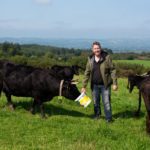 Pat Mckenna farms a Dexter suckler herd in Co. Monaghan. The farm is situated on 60 acres of marginal land at the foothills of Sliabh Beagh. The herd consists of about 90 cattle and Pat operates a calf to beef system. The premium Dexter beef is sold direct to restaurants and local customers. Last year Pat took part in the Sliabh Beagh conservation grazing trial. The objective of this trial is to reduce fire risks on the mountain. Sliabh Beagh is also a hen harrier protected area. “Using cattle and a conservation grazing system on the mountain aims to improve the habitat by breaking down the pasture, loosening it and opening it up.” This means there is more life on the ground thus providing a better chance for the hen harrier and other ground nesting birds. Pat operates a low input farming system. No chemical fertilizer is used on the land. The only inputs are farmyard manure, slurry and dry bedding. Pat’s farm is located in a curlew protected area, as such he does not cut any grass until July/August. There is a traditional hay meadow on the farm of about 7 acres. There was 12 acres of broadleaf forestry planted 8 years ago, which provides a habitat for many birds and creatures. More information on Pat’s farm here. Ambassador since 2021
Pat Mckenna farms a Dexter suckler herd in Co. Monaghan. The farm is situated on 60 acres of marginal land at the foothills of Sliabh Beagh. The herd consists of about 90 cattle and Pat operates a calf to beef system. The premium Dexter beef is sold direct to restaurants and local customers. Last year Pat took part in the Sliabh Beagh conservation grazing trial. The objective of this trial is to reduce fire risks on the mountain. Sliabh Beagh is also a hen harrier protected area. “Using cattle and a conservation grazing system on the mountain aims to improve the habitat by breaking down the pasture, loosening it and opening it up.” This means there is more life on the ground thus providing a better chance for the hen harrier and other ground nesting birds. Pat operates a low input farming system. No chemical fertilizer is used on the land. The only inputs are farmyard manure, slurry and dry bedding. Pat’s farm is located in a curlew protected area, as such he does not cut any grass until July/August. There is a traditional hay meadow on the farm of about 7 acres. There was 12 acres of broadleaf forestry planted 8 years ago, which provides a habitat for many birds and creatures. More information on Pat’s farm here. Ambassador since 2021
Pat Mulrooney (Co.Tipperary)
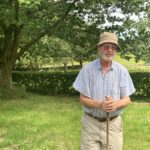 Pat Mulrooney is a lifelong farmer who runs an organic dairy farm near Clonmel County Tipperary. Originally a conventional tillage farmer, Pat transitioned to organic in 1987 and now runs a dairy system, milking approximately 90 cows. Pat is a founding member of the organic dairy co-op The Little Milk Company, and approximately 90% of his milk is supplied to this dairy to produce organic Irish cheese. Pat also grows 20 acres of organic oats for Flahavans. A pioneer in organic dairy farming in Ireland, Pat has used no artificial sprays or nitrogen on his land in over 30 years. Veterinary intervention is used only when absolutely necessary. The farm is managed in the most extensive manner possible while remaining within the parameters of a commercial organic dairy farm. A nature lover his entire life, Pat has taken numerous actions on his farm to protect and enhance nature on the land. Hedgerows are managed for wildlife and biodiversity. Multispecies mature pastures provide habitat for insects as well as varied diet for his livestock. Areas of meadow and mature woodland also provide a crucial habitat for insects and birds on the land. More information on Pat’s farm here. Ambassador since 2022
Pat Mulrooney is a lifelong farmer who runs an organic dairy farm near Clonmel County Tipperary. Originally a conventional tillage farmer, Pat transitioned to organic in 1987 and now runs a dairy system, milking approximately 90 cows. Pat is a founding member of the organic dairy co-op The Little Milk Company, and approximately 90% of his milk is supplied to this dairy to produce organic Irish cheese. Pat also grows 20 acres of organic oats for Flahavans. A pioneer in organic dairy farming in Ireland, Pat has used no artificial sprays or nitrogen on his land in over 30 years. Veterinary intervention is used only when absolutely necessary. The farm is managed in the most extensive manner possible while remaining within the parameters of a commercial organic dairy farm. A nature lover his entire life, Pat has taken numerous actions on his farm to protect and enhance nature on the land. Hedgerows are managed for wildlife and biodiversity. Multispecies mature pastures provide habitat for insects as well as varied diet for his livestock. Areas of meadow and mature woodland also provide a crucial habitat for insects and birds on the land. More information on Pat’s farm here. Ambassador since 2022
Pat Lalor (Co.Westmeath)
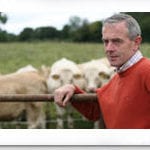 Pat Lalor has just under 300 acres in Co. Westmeath which he converted to organic 20 years ago. Pat describes organic farming as working with respect for the soil and he is totally committed to this practice; using farmyard manure from his cattle to grow clover, cereal and grass on rotation. He has half the farm in arable and half in beef where he keeps 130 weanlings for a year. Through this he has built up a thriving ‘field to fork’ business – Ballard Organic Farm. Pat sells his produce under the label ‘Kilbeggan Organic Foods’ and the range includes the award-winning Kilbeggan Porridge, porridge bread mix and handmade oat biscuits. He has added value to his product as it is under his own brand and it is 100% theirs with no imports. This side of the business involves Pat’s wife and children and their products are available in retail outlets and on-line. Pat is a strong advocate for organic farming. He operated an open farm for 20 years, welcoming school groups, agricultural students and interested members of the public, always willing to share his knowledge and experience of organic farming. “Whilst conventional farming is about the chemistry of the soil, organic farming is about the biology of the soil. When Birdwatch Ireland did a survey of songbirds there were 32/33 present – three times more than the average conventional farm.” More information on Pat’s farm here. Ambassador since 2020
Pat Lalor has just under 300 acres in Co. Westmeath which he converted to organic 20 years ago. Pat describes organic farming as working with respect for the soil and he is totally committed to this practice; using farmyard manure from his cattle to grow clover, cereal and grass on rotation. He has half the farm in arable and half in beef where he keeps 130 weanlings for a year. Through this he has built up a thriving ‘field to fork’ business – Ballard Organic Farm. Pat sells his produce under the label ‘Kilbeggan Organic Foods’ and the range includes the award-winning Kilbeggan Porridge, porridge bread mix and handmade oat biscuits. He has added value to his product as it is under his own brand and it is 100% theirs with no imports. This side of the business involves Pat’s wife and children and their products are available in retail outlets and on-line. Pat is a strong advocate for organic farming. He operated an open farm for 20 years, welcoming school groups, agricultural students and interested members of the public, always willing to share his knowledge and experience of organic farming. “Whilst conventional farming is about the chemistry of the soil, organic farming is about the biology of the soil. When Birdwatch Ireland did a survey of songbirds there were 32/33 present – three times more than the average conventional farm.” More information on Pat’s farm here. Ambassador since 2020
Patrick Frankel (Co.Cork)
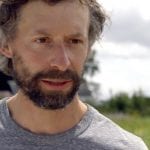 Patrick Frankel runs Kilbrack Organic Farm with his partner Judith and their young family. This is a 145-acre farm in Doneraile, Co. Cork. His main focus is a wide a range of organic vegetables with 45 crops throughout the seasons, that he sales directly to consumers and supplies 26 restaurants in Cork city and the surrounding areas. He also has shorthorn cattle which he sells at 30-months, and a beech and oak woodland. Patrick has a deep interest in biodiversity, soil heath and sustainable food production. He grows in a walled garden combining an orchard with potatoes and a wide range of vegetables including leeks, kale, garlic, Jerusalem artichokes, potatoes, tomatoes, french beans and salad leaves. He has 4 polytunnels that specialise in overwinter salads, and summer crops such as peppers, tomatoes and aubergines. The diversity in produce at Kilbrack is outstanding while enhancing the diversity in the surrounding agroecological system. “I am amazed by what can come off relatively small piece of land. What it gives back over and over if you look after it. The market is not filled, there is so much demand for organics, there is so much opportunity here without importing. I have faith in farmers that they will adapt to our changing climate as they are in touch with elements and will react.” Patrick and Judith are keen on educating others on market gardening with up to 50 Woofers each year coming to the farm. More information and a short film on Patrick’s farm here. Ambassador since 2020
Patrick Frankel runs Kilbrack Organic Farm with his partner Judith and their young family. This is a 145-acre farm in Doneraile, Co. Cork. His main focus is a wide a range of organic vegetables with 45 crops throughout the seasons, that he sales directly to consumers and supplies 26 restaurants in Cork city and the surrounding areas. He also has shorthorn cattle which he sells at 30-months, and a beech and oak woodland. Patrick has a deep interest in biodiversity, soil heath and sustainable food production. He grows in a walled garden combining an orchard with potatoes and a wide range of vegetables including leeks, kale, garlic, Jerusalem artichokes, potatoes, tomatoes, french beans and salad leaves. He has 4 polytunnels that specialise in overwinter salads, and summer crops such as peppers, tomatoes and aubergines. The diversity in produce at Kilbrack is outstanding while enhancing the diversity in the surrounding agroecological system. “I am amazed by what can come off relatively small piece of land. What it gives back over and over if you look after it. The market is not filled, there is so much demand for organics, there is so much opportunity here without importing. I have faith in farmers that they will adapt to our changing climate as they are in touch with elements and will react.” Patrick and Judith are keen on educating others on market gardening with up to 50 Woofers each year coming to the farm. More information and a short film on Patrick’s farm here. Ambassador since 2020
Patsy Carrucan (Co.Clare)
Patsy farms 200 acres of rough winterage grassland and lowland grassland in Fanore, Co.Clare. Patsy is very proud of the Burren, his homeland and he has worked tirelessly to help develop a results-based agri-environment programme as an active contributor to the BurrenLIFE Project and Burren Programme. On his own farm Patsy has adjusted his grazing and feeding regimes to encourage greater biodiversity outcomes on his upland and lowland grasslands, using his management skills and experience to do so. He is also very mindful of the built heritage of the area and has restored shelter walls, boundary walls and placed traditional Burren Style gates around his farm, greatly improving the visual nature of the landscape for locals and visitors to enjoy. “Outwintering the stock on Winterage grassland keeps the cost of wintering animals at a very low level but also frees up a lot of time for our other work and community involvement. Over 100 acres of the farm is in an archaeological complex which strengthens our bond with past and our caring for what we want to leave behind us. Every day I walk out on the farm here in Fanore, I am inspired by the beauty of the area I live in and I ask myself, how did I get to be so lucky to be able to bring up a family in this wonderful landscape and why would I not want to leave it to the next generation in as good a condition, if not better, than the condition in which I received it?” More information on Patsy’s farm here. Ambassador since 2020
Paul McCormick & Jacinta French (Co.Cork)
Paul and Jacinta run a 30-acre mixed farm near Skibbereen County Cork. There is about 16 acres of grassland and 14 acres of mixed woodland on the farm. Some of the woodland is mature with old native trees and other parts were planted by Paul and Jacinta over the years. Having previously run a tree nursery, they experiment with different trees such as cobnut, chestnut, walnut and heartnut trees. They breed a small herd of Droimeann cattle, producing high quality beef that is sold direct to neighbours and friends. Interested in agroforestry, Paul has spent a number of years converting parts of the woodland to a pasture-based wood. Meaning the animals graze the woodland during the summer and autumn season, but in the spring the woodland is left to give spring flowers the opportunity to bloom. Paul and Jacinta are also working hard to re-diversify the grassland as much as possible. One way they are doing this is by feeding a specifically selected multi-species hay to the cattle over the summer months, in the hope that the cattle will help to reintroduce these different grass species back into the seedbank of the soil. Paul and Jacinta take deep consideration for biodiversity and wildlife with every decision they make on the land. There are a few ponds on the land and a river also flows through the farm. Other valuable habitats include the permanent pasture, woodland, a riparian zone along the riverfront and areas of rewilded land. They are delighted to witness the return of bird species like the tree creeper, the red pole, the goldcrest and buzzards to the farm. More information on Paul and Jacinta’s farm here. Ambassador since 2022
Paul Moore (Co.Cork)
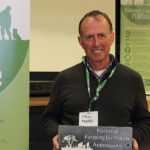 Paul Moore runs a tillage and beef farm near Middleton county Cork. The mixed 140-acre farm is comprised of 95 acres of tillage, producing malting barley, spring beans, winter barley and oilseed rape. Paul has recently began incorporating regenerative practices on the farm such as the use of multi-species cover crops, longer crop rotations and strip-tilling the spring beans. The remaining 45 acres is mature grassland and is used to produce 35 Hereford and Angus beef cattle. A wildlife and bird enthusiast all his life, Paul is passionate about nature conservation and managing habitats on his farm. Over the years he has planted trees on the land, managed hedgerows for birds, incorporated wildflower margins around field boundaries and increased the nature corridors where possible on the farm. The land is home to many bird species, many of whom are becoming scare in the Irish countryside. There are barn owls, stock doves, swifts, ravens, buzzards, reed buntings, yellowhammers, meadow pipits, stonechats, starlings, house sparrows and more. Foxes, stoats, shrews and rabbits are also a common sight on the farm. Paul is an advocate for an economically viable and productive farming system, that simultaneously protects farmland habitats and enhances biodiversity on Irish farms. “My whole mantra would be – you don’t have to manage a nature reserve, if every farmer did a little and did it properly, it would all add up and have an impact.” More information and a short film on Paul’s farm here. Ambassador since 2021
Paul Moore runs a tillage and beef farm near Middleton county Cork. The mixed 140-acre farm is comprised of 95 acres of tillage, producing malting barley, spring beans, winter barley and oilseed rape. Paul has recently began incorporating regenerative practices on the farm such as the use of multi-species cover crops, longer crop rotations and strip-tilling the spring beans. The remaining 45 acres is mature grassland and is used to produce 35 Hereford and Angus beef cattle. A wildlife and bird enthusiast all his life, Paul is passionate about nature conservation and managing habitats on his farm. Over the years he has planted trees on the land, managed hedgerows for birds, incorporated wildflower margins around field boundaries and increased the nature corridors where possible on the farm. The land is home to many bird species, many of whom are becoming scare in the Irish countryside. There are barn owls, stock doves, swifts, ravens, buzzards, reed buntings, yellowhammers, meadow pipits, stonechats, starlings, house sparrows and more. Foxes, stoats, shrews and rabbits are also a common sight on the farm. Paul is an advocate for an economically viable and productive farming system, that simultaneously protects farmland habitats and enhances biodiversity on Irish farms. “My whole mantra would be – you don’t have to manage a nature reserve, if every farmer did a little and did it properly, it would all add up and have an impact.” More information and a short film on Paul’s farm here. Ambassador since 2021
Pickersgill Family (Co. Westmeath)
Pen Saugnier and her mother Diana Pickersgill runs a mixed organic farm with the help of other family members, near Mullingar Co. Westmeath. There is 40 acres of multispecies sward and about 8ha of mixed broadleaf woodland on the farm which is operated under a continuous cover forestry system. They have 28 acres of tillage with cover crops and tillage crops. As advocates for the importance of maintaining diversity on farms, they keep a variety of stock on the land but maintain low stocking numbers. They keep Dexter cattle, sheep, sows, donkeys and chickens. There is also a kitchen garden on the farm and oats are grown to supplement winter feedback and provide straw for bedding. Habitats on the farm include woodlands, hedgerows, wetland areas with 2 ponds, and orchard, meadows and wildflower areas. More information on the Pickersgill’s farm here. Ambassadors since 2023.
Rod and Julie Calder-Potts (Co.Kilkenny)
 Located in county Kilkenny on land steeped in family history, Highbank Farm have been producing organic apples on the family farm since the 70s. Rod and Julie Calder-Potts are prime examples of farmers who have diversified their farm, creating an enterprise that is ecologically and economically viable. Their organic orchard supplies them with apples for artisan apple juice, apple syrup, apple cider, vinegars and much more, almost all of which are processed on the farm. They have more recently built a distillery on the farm and are now producing apple gin, apple brandy and apple vodka. Respect for and connection with nature is at the heart of the farm – “All of our production is to the strictest of organic standards. No chemicals are sprayed on the apples, neither are any herbicides or chemical fertilizers used.” They continuously work to enhance biodiversity on the farm. They have built two lakes, planted forestry all around the farm and sowed pollinator friendly flowers to encourage solitary bees amongst other insects. There is a wonderfully diverse range of wildlife on the farm, including a badger set, snipe, otters, kingfishers, raptors, buzzards, crows, rooks, jackdaws, ravens, magpies, jays, woodcock, as well as a wide range of insects and fungi. Rod and Julie are passionate about supporting small-scale Irish farmers and producers. They welcome visitors from near and far to their farm and run farm walks, talks, events and workshops throughout the year. More information on the Calder-Potts’ farm here. Ambassador since 2021
Located in county Kilkenny on land steeped in family history, Highbank Farm have been producing organic apples on the family farm since the 70s. Rod and Julie Calder-Potts are prime examples of farmers who have diversified their farm, creating an enterprise that is ecologically and economically viable. Their organic orchard supplies them with apples for artisan apple juice, apple syrup, apple cider, vinegars and much more, almost all of which are processed on the farm. They have more recently built a distillery on the farm and are now producing apple gin, apple brandy and apple vodka. Respect for and connection with nature is at the heart of the farm – “All of our production is to the strictest of organic standards. No chemicals are sprayed on the apples, neither are any herbicides or chemical fertilizers used.” They continuously work to enhance biodiversity on the farm. They have built two lakes, planted forestry all around the farm and sowed pollinator friendly flowers to encourage solitary bees amongst other insects. There is a wonderfully diverse range of wildlife on the farm, including a badger set, snipe, otters, kingfishers, raptors, buzzards, crows, rooks, jackdaws, ravens, magpies, jays, woodcock, as well as a wide range of insects and fungi. Rod and Julie are passionate about supporting small-scale Irish farmers and producers. They welcome visitors from near and far to their farm and run farm walks, talks, events and workshops throughout the year. More information on the Calder-Potts’ farm here. Ambassador since 2021
Sean Condon (Co.Limerick)
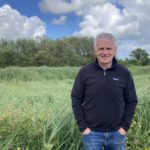 Sean Condon is an organic dairy farmer from Crecora, County Limerick. He farms about 140 acres of good grassland and runs an extensive dairy farming system, milking 50 cows once a day. External inputs on the farm are extremely low and Sean takes pride in managing a low-input, low intensity productive farm. Some of the milk produced is sold under Sean’s own brand of organic raw milk – Templeroe milk. The remainder is sold to the Little Milk Company. Sean is passionate about maintaining traditional farming systems whereby production and nature work in harmony – “For me, farming for nature may be more about what I’m not doing rather than what I am doing”. Permanent pasture, mature hedgerows, pockets of woodland and a pond all provide important habitats for the healthy population of birds and other wildlife on the land. Some years ago, a reed-bed system was installed to clean run-off water from the farmyard. Sean leaves wild plants grow around the farm and recognises their importance in farmland ecosystems – “if you don’t have some weeds on the land then you don’t have insects, and without insects there is not much food source for young birds”. More information on Sean’s farm here. Ambassador since 2022
Sean Condon is an organic dairy farmer from Crecora, County Limerick. He farms about 140 acres of good grassland and runs an extensive dairy farming system, milking 50 cows once a day. External inputs on the farm are extremely low and Sean takes pride in managing a low-input, low intensity productive farm. Some of the milk produced is sold under Sean’s own brand of organic raw milk – Templeroe milk. The remainder is sold to the Little Milk Company. Sean is passionate about maintaining traditional farming systems whereby production and nature work in harmony – “For me, farming for nature may be more about what I’m not doing rather than what I am doing”. Permanent pasture, mature hedgerows, pockets of woodland and a pond all provide important habitats for the healthy population of birds and other wildlife on the land. Some years ago, a reed-bed system was installed to clean run-off water from the farmyard. Sean leaves wild plants grow around the farm and recognises their importance in farmland ecosystems – “if you don’t have some weeds on the land then you don’t have insects, and without insects there is not much food source for young birds”. More information on Sean’s farm here. Ambassador since 2022
Sean O’Farrell (Co.Tipperary)
Sean manages a 60-acre certified organic Cloncannon farm on the western slopes of the Devil’s bit Mountains, near Moneygall in North Tipperary. Sean keeps a 20 cow suckler herd, as well as pigs, poultry and goats. With a Master’s degree in Biodiversity and Conservation, Sean is a heritage enthusiast, continuously planting native trees, putting in ponds for wildlife and pollinator strips for his beehives and birdlife. He does this to encourage biodiversity but also for his personal fulfilment and satisfaction ‘for when he has aged 30 or 40 years from now’. He says that this is part of ‘my 5 year plan, my 50 year plan, my 500 year plan’ and feels that farmers should think long-term like the native Americans, ‘seven generations from now’ Sean feels he is on a journey of learning and he is particularly passionate about the importance of soil and making sure it is properly nurtured to ensure good crop health – ‘the microbes and the fungi – so minute yet so powerful, they drive the whole system’. Sean runs numerous education programmes for primary and secondary schools, hosts events for Biodiversity and Heritage Week and opens the farm as an eco-tourist visitor site. I am enjoying the journey of learning and building the fulfilment I can gain from nature into the future. More information and a short film on Sean’s farm here. Ambassador since 2018
Shackleton Family (Co.Cavan)
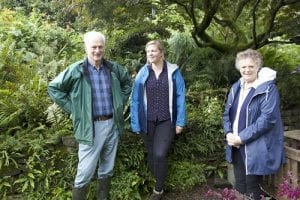 The Shackleton family farm 320-acres and have been providing organic grass-fed beef and lamb to their customer since 1996. Grazing traditional breeds Aberdeen Angus and Belted Galloway occurs on 60ha of the farm. The farm also has 5ha of semi-natural habitats including bogs, wetland (Mullagh Lake), woodland, hedgerows, hay meadows and stonewalls, all of which are managed by owners who have qualifications in ecology, landscape design and environmental management. New habitats have been created, such as a 20ha mixed conifer and hardwood woodland which is managed as agroforestry; hedgerows and an ornamental garden which supports a varied bird population. The farm has a traditional orchard, bee hive and is self-sufficient in vegetables. Monitoring of birds and insects for Biodiversity Ireland is ongoing. The farm is also open for farm walks for IOGFA, Bord Bia and others. A boardwalk and birdwatching hide have been constructed along the lake edge. A publicly assessable nature walk passes through the farm and the explanatory information panel along this route in the farm is curated by the owners. The Shackletons are fully committed to their approach to farming and enthusiastic to share this knowledge and experience online, with groups, the local community and schools. They believe “Farming extensively is the future, it is better for the bank, the life balance, the herd and most importantly the wildlife”. More information and a short film on their farm here. Ambassadors since 2020
The Shackleton family farm 320-acres and have been providing organic grass-fed beef and lamb to their customer since 1996. Grazing traditional breeds Aberdeen Angus and Belted Galloway occurs on 60ha of the farm. The farm also has 5ha of semi-natural habitats including bogs, wetland (Mullagh Lake), woodland, hedgerows, hay meadows and stonewalls, all of which are managed by owners who have qualifications in ecology, landscape design and environmental management. New habitats have been created, such as a 20ha mixed conifer and hardwood woodland which is managed as agroforestry; hedgerows and an ornamental garden which supports a varied bird population. The farm has a traditional orchard, bee hive and is self-sufficient in vegetables. Monitoring of birds and insects for Biodiversity Ireland is ongoing. The farm is also open for farm walks for IOGFA, Bord Bia and others. A boardwalk and birdwatching hide have been constructed along the lake edge. A publicly assessable nature walk passes through the farm and the explanatory information panel along this route in the farm is curated by the owners. The Shackletons are fully committed to their approach to farming and enthusiastic to share this knowledge and experience online, with groups, the local community and schools. They believe “Farming extensively is the future, it is better for the bank, the life balance, the herd and most importantly the wildlife”. More information and a short film on their farm here. Ambassadors since 2020
Sinéad Moran and Michael McGrath (Co.Mayo)
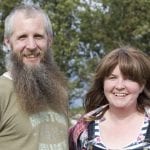 Sinéad Moran & Mick McGrath own a micro-dairy with a herd of traditional breed cows on 40-acres of high nature value farmland in Co. Mayo where they sell raw organic milk direct to customer. They are passionate about conserving the species-rich grass, mature trees and both retaining and enhancing biodiversity that is found on their farm. The land has been in Mick’s family for years and was never farmed intensively. The ground hasn’t been re-seeded, overstocked, fields widen or hedges removed. The land has an old orchard, an old cottage, granary and mature trees dominate all but a few boundaries. This landscape relies on grazing animals and they manage it in a way that both conserves and preserves the land’s biodiversity through holistic grazing while still producing nutrient-rich food for direct sale to the local community. “Our rich yellow butter is down to both the traditional breeds we use but also the diversity they eat… if anyone wants to something to farm better for nature, then definitely include more diversity both in the animals and what they eat”. Sinéad is passionate about environmental issues and climate activism, and has open up her farm as a place of educating others on what they can do to mitigate climate change. More information and a short film on their farm here. Ambassadors since 2020
Sinéad Moran & Mick McGrath own a micro-dairy with a herd of traditional breed cows on 40-acres of high nature value farmland in Co. Mayo where they sell raw organic milk direct to customer. They are passionate about conserving the species-rich grass, mature trees and both retaining and enhancing biodiversity that is found on their farm. The land has been in Mick’s family for years and was never farmed intensively. The ground hasn’t been re-seeded, overstocked, fields widen or hedges removed. The land has an old orchard, an old cottage, granary and mature trees dominate all but a few boundaries. This landscape relies on grazing animals and they manage it in a way that both conserves and preserves the land’s biodiversity through holistic grazing while still producing nutrient-rich food for direct sale to the local community. “Our rich yellow butter is down to both the traditional breeds we use but also the diversity they eat… if anyone wants to something to farm better for nature, then definitely include more diversity both in the animals and what they eat”. Sinéad is passionate about environmental issues and climate activism, and has open up her farm as a place of educating others on what they can do to mitigate climate change. More information and a short film on their farm here. Ambassadors since 2020
Stephen Morrison (Co.Kildare)
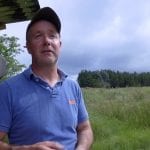 Stephen is a full time farmer with an 80 cow suckler herd, taking all progeny to finish. He is not organic but is transitioning away from inputs. He also has a tillage and forestry enterprise in place. Whilst the farm is busy and productive, Stephen farms in a balanced way that he has a low impact on the wildlife that live and breed on these lands. He continues to add biodiversity each year. He has fenced off the watercourses on the farm and allowed riparian margins to develop along these areas. “The biggest eyeopener for me was when I fenced off the water courses what I noticed was how much nature just came back and took hold over the years” He has dug out a network of ponds in an area of fen to provide a habitat of any aquatic species that may colonise this special area. He planted 18 acres of native woodlands, also has a 2-acre plot that is in wildbird cover for the past three years. Additionally, a wildbird area has been planted with bushes and trees specifically chosen for their potential to provide nuts and seeds for birds located alongside the Hartwell Stream that flows through the farm. The most recent addition has been a forest garden planted last winter – the acre plot is full of bushes and trees but each one of the 150 plants will produce fruit, nuts or seeds. “It is about giving nature a chance, and sometimes it is more about what you don’t do than what you do”. More information and a short film on Stephen’s farm here. Ambassador since 2020
Stephen is a full time farmer with an 80 cow suckler herd, taking all progeny to finish. He is not organic but is transitioning away from inputs. He also has a tillage and forestry enterprise in place. Whilst the farm is busy and productive, Stephen farms in a balanced way that he has a low impact on the wildlife that live and breed on these lands. He continues to add biodiversity each year. He has fenced off the watercourses on the farm and allowed riparian margins to develop along these areas. “The biggest eyeopener for me was when I fenced off the water courses what I noticed was how much nature just came back and took hold over the years” He has dug out a network of ponds in an area of fen to provide a habitat of any aquatic species that may colonise this special area. He planted 18 acres of native woodlands, also has a 2-acre plot that is in wildbird cover for the past three years. Additionally, a wildbird area has been planted with bushes and trees specifically chosen for their potential to provide nuts and seeds for birds located alongside the Hartwell Stream that flows through the farm. The most recent addition has been a forest garden planted last winter – the acre plot is full of bushes and trees but each one of the 150 plants will produce fruit, nuts or seeds. “It is about giving nature a chance, and sometimes it is more about what you don’t do than what you do”. More information and a short film on Stephen’s farm here. Ambassador since 2020
Suzanna Crampton (Co.Kilkenny)
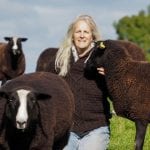 Suzanna’s farm is near Bennetts Bridge, in Co. Kilkenny. The farm’s species-rich meadows and pastures, woodlands, parkland, and numerous stand-alone mature trees, form a haven for local wildlife. She farms 12 acres on which she has 30 ewes and followers. They have access to a mixed sward with 17 different species of grasses alone. Suzanna practices regenerative agriculture with a rare breed of sheep that is triflective (milk, meat, fleece). She designs blankets from the wool that she has won awards for over the years. Additionally, a decades-old traditional orchard provides bountiful fruit and further herb-rich grazing for her sheep, with mature hedges that add even more habitat diversity for native plants, insects and birds. Suzanna regularly undertakes public engagements speaking to local, national and international audiences about regenerative farming. More information and a short film on Suzanna’s farm here. Ambassador since 2019
Suzanna’s farm is near Bennetts Bridge, in Co. Kilkenny. The farm’s species-rich meadows and pastures, woodlands, parkland, and numerous stand-alone mature trees, form a haven for local wildlife. She farms 12 acres on which she has 30 ewes and followers. They have access to a mixed sward with 17 different species of grasses alone. Suzanna practices regenerative agriculture with a rare breed of sheep that is triflective (milk, meat, fleece). She designs blankets from the wool that she has won awards for over the years. Additionally, a decades-old traditional orchard provides bountiful fruit and further herb-rich grazing for her sheep, with mature hedges that add even more habitat diversity for native plants, insects and birds. Suzanna regularly undertakes public engagements speaking to local, national and international audiences about regenerative farming. More information and a short film on Suzanna’s farm here. Ambassador since 2019
Thomas Fouhy (Co.Cork)
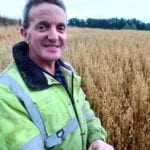 Thomas is an organic, min-till, stockless, arable farmer with 84 acres in north Co. Cork. Apart from the many trees and hedgerows on his land, he proactively farms all available ground. Nature takes advantage of how well he manages the delicate balance of building and maintaining soil health. Thomas crops on a 10-year flexible rotation that includes speciality crops like grain-lupins, linseed, lentils, sunflowers, as well as the standard grain crops. He has 10 acres of just flowers! He demonstrates the breadth of largely unexplored crops we can produce in Ireland and highlights our potential to produce our own protein crops, reducing our reliance on imported soy. The soil is never bare for long, crops are under-sown with red clover, and diverse winter cover-crop mixes fill the gaps between the cash crops. Many of the cash-crops and the cover-crops are flowering, providing great seasonal diversity for pollinators. Thomas’s farming is truly productive, profitable, and works in sync with nature – a real symbiosis. He is a shining example of how innovative and cutting edge organic arable farming can be. Thomas tells a story of how a hedgehog followed by her prickle of hoglets nonchalantly rambled past him on his farm lane one day – then he knew he must be doing something right! More information on Thomas’s farm here. Ambassador since 2020
Thomas is an organic, min-till, stockless, arable farmer with 84 acres in north Co. Cork. Apart from the many trees and hedgerows on his land, he proactively farms all available ground. Nature takes advantage of how well he manages the delicate balance of building and maintaining soil health. Thomas crops on a 10-year flexible rotation that includes speciality crops like grain-lupins, linseed, lentils, sunflowers, as well as the standard grain crops. He has 10 acres of just flowers! He demonstrates the breadth of largely unexplored crops we can produce in Ireland and highlights our potential to produce our own protein crops, reducing our reliance on imported soy. The soil is never bare for long, crops are under-sown with red clover, and diverse winter cover-crop mixes fill the gaps between the cash crops. Many of the cash-crops and the cover-crops are flowering, providing great seasonal diversity for pollinators. Thomas’s farming is truly productive, profitable, and works in sync with nature – a real symbiosis. He is a shining example of how innovative and cutting edge organic arable farming can be. Thomas tells a story of how a hedgehog followed by her prickle of hoglets nonchalantly rambled past him on his farm lane one day – then he knew he must be doing something right! More information on Thomas’s farm here. Ambassador since 2020
Thomas and Claire O’Connor (Co.Kerry)
Thomas and Claire manage a 25-acre mixed organic farm in Gleann na Gealt, Camp, Co. Kerry. They produce vegetables, salads, wheatgrass, meat, poultry and eggs which they sell locally in their shop in Tralee (Manna Organic Store). They have 15-acres of native Irish woodland and 4-acres of permaculture including fruit trees. They are a great example of diverse food production and biodiversity production all on very marginal land, of proving what is possible. “Climate change is caused by the disconnection with the land and we need to produce farming systems that are less energy intensive” More information and a short film on Thomas and Claire’s farm here. Ambassador since 2019
Thomas Keane (Co.Galway)
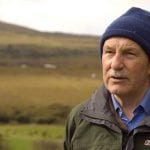 Tom Keane farms in the Dawros catchment in Connemara. He farms 160 mountain ewes on a mosaic of high nature value peatlands and wet grasslands and is a participant of the Pearl Mussel Project EIP. The Pearl Mussel Project rewards farmers for the ecological quality of their land, which in turn contributes to the pristine water quality needed by the Freshwater Pearl Mussel. Tom’s system of farming has maintained and enhanced large areas of active Atlantic blanket bog, achieving a score of 10/10 on the Pearl mussel peatland score card for much of it. This is an excellent example of perfectly intact peatland which is farmed in a manner to benefit both the stock and the land. Tom is very passionate about where he farms, he feels one of the best things about farming in this area is the wild nature of the area. He ensures his stock are rotated regularly and works with nature to get the best from his land. Tom is a farmer with a strong understanding of the crucial importance of his land management to the environment. He notices and knows nature, as he does farming, recognising not just the challenges but the rewards of hill farming. More information and a short film on Thomas’s farm here. Ambassador since 2020
Tom Keane farms in the Dawros catchment in Connemara. He farms 160 mountain ewes on a mosaic of high nature value peatlands and wet grasslands and is a participant of the Pearl Mussel Project EIP. The Pearl Mussel Project rewards farmers for the ecological quality of their land, which in turn contributes to the pristine water quality needed by the Freshwater Pearl Mussel. Tom’s system of farming has maintained and enhanced large areas of active Atlantic blanket bog, achieving a score of 10/10 on the Pearl mussel peatland score card for much of it. This is an excellent example of perfectly intact peatland which is farmed in a manner to benefit both the stock and the land. Tom is very passionate about where he farms, he feels one of the best things about farming in this area is the wild nature of the area. He ensures his stock are rotated regularly and works with nature to get the best from his land. Tom is a farmer with a strong understanding of the crucial importance of his land management to the environment. He notices and knows nature, as he does farming, recognising not just the challenges but the rewards of hill farming. More information and a short film on Thomas’s farm here. Ambassador since 2020
Thomas Stack (Co.Limerick)
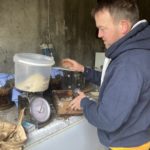 Thomas Stack is a dairy farmer from Co. Limerick. Having taken over the family farm in 2012 and farming conventionally for a few years, he decided something had to change. He embarked on an ambitious journey to transform his farm into a system that is resilient to environmental and financial shocks. Thomas transitioned to organic farming in 2018 and since then he has adopted the Korean Natural Farming method. This regenerative approach uses indigenous microorganisms (IMO) to create fertile soils that produce a high output without the use of synthetic fertilizer, herbicides or pesticides. “You can’t see these microbes. The only way you can see them is under the microscope and they’re the most powerful thing in the world…to see how they have transformed my farm in a year and a half – it’s mind-blowing.” Thomas creates IMO solutions that are highly rich in nutrients and enzymes, he sprays these solutions on the land, working in tune with the nutrient cycle of the plants. Thomas milks 60 dairy cows on virtually no external inputs. His cows are entirely grass-fed and he produces high quality organic milk. He creates his own nutritional supplements for his animals using only natural inputs and processes. “I use the land and nature to produce all my inputs on the farm and to enhance the soil biology”. Thomas has planted over 1000 native trees on the land to support biodiversity and encourage more wildlife back to the farm. He regularly hosts farm visits for those interested in learning more about this dynamic farming system. More information on Thomas’s farm here. Ambassador since 2021
Thomas Stack is a dairy farmer from Co. Limerick. Having taken over the family farm in 2012 and farming conventionally for a few years, he decided something had to change. He embarked on an ambitious journey to transform his farm into a system that is resilient to environmental and financial shocks. Thomas transitioned to organic farming in 2018 and since then he has adopted the Korean Natural Farming method. This regenerative approach uses indigenous microorganisms (IMO) to create fertile soils that produce a high output without the use of synthetic fertilizer, herbicides or pesticides. “You can’t see these microbes. The only way you can see them is under the microscope and they’re the most powerful thing in the world…to see how they have transformed my farm in a year and a half – it’s mind-blowing.” Thomas creates IMO solutions that are highly rich in nutrients and enzymes, he sprays these solutions on the land, working in tune with the nutrient cycle of the plants. Thomas milks 60 dairy cows on virtually no external inputs. His cows are entirely grass-fed and he produces high quality organic milk. He creates his own nutritional supplements for his animals using only natural inputs and processes. “I use the land and nature to produce all my inputs on the farm and to enhance the soil biology”. Thomas has planted over 1000 native trees on the land to support biodiversity and encourage more wildlife back to the farm. He regularly hosts farm visits for those interested in learning more about this dynamic farming system. More information on Thomas’s farm here. Ambassador since 2021
Tom Tierney (Co. Kildare)
Tom Tierney runs a 200-acre regenerative tillage farm in county Kildare. He has been running a direct drilling system since 2015 and has observed tremendous benefits of this lower soil disturbance method for life both above and below the soil surface. He has reduced the amount of synthetic inputs required on the farm and there has been no insecticide used on the land in 6 years. He has two wormery’s on the farm and he makes his own bio-stimulants from vermi-juice, seaweed, molasses and silica which further build the soil biology. There is about 30 acres of mixed forestry on the farm, 60% hardwood and 40% softwood and Tom operates a continuous cover forestry system. There are about 12 acres of conservation areas on the farm. There is an acre of wetland with naturally regenerating woodland. There are 7 acres of wildflowers on the farm and 4 acres of permanent clover. More information on Tom’s farm here. Ambassador since 2023.
Tommy Earley (Co.Roscommon)
Tommy manages his 100-acre organic Aberdeen Angus suckler farm on the shores of Lough Allen, Co. Roscommon. He has been farming organically on the site since 1996 with a clear focus on nature and habitat conservation. His farm has high natural value with a variety of habitats such as intact raised bog, mature native woodland, species rich acidic grassland, wildflower meadows, lakeshore and river. Tommy’s active role in local conservation has inspired others to follow his example in promoting nature on their own lands. “We have lost of a sense of connectiveness under our feet and once we get that reestablished we will be on our way to a healthier planet” More information and a short film on Tommy’s farm here. Ambassador since 2019
Trevor Harris (Co.Kildare)
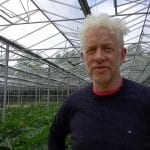 Trevor runs two farms, there is the home farm, 140-acres, which is cattle and sheep both organic and biodynamic certified. He grazes the two together, selling his beef directly and the lamb is through ICM. It is a mixed enterprise with 12 acres in forestry and 40acres in cereal – he sells his oats to Flavahans and his barley to make a biodynamic whiskey. The second farm is horticultural land, 14 acres outdoors and 1500sqm indoors, where he is growing vegetables for restaurants, a box scheme and retail. On both farms, Trevor is passionate about soil health which is to the fore in his approach to management of his enterprise, the focus is to build resilience in the soil through diversity. “I feel it is so important to build the fertility in the soil as where there is a good biome, the produce will taste better.” This involves getting the right mineral balance and physical soil structure to encourage soil biology to flourish. Diversity of plants also encourages diversity in the insect and bird communities which helps keep everything in balance so that no one species will dominate and cause problems for the farm crops. He has planted trees and hedges. He has planted an oak woodland (3 acres). He has established a small orchard with a native meadow underneath. He believes “one thing we can all do is just leave our hedgerows grow and flourish”. Trevor produces good yields without any chemical inputs. More information and a short film on Trevor’s farm here. Ambassador since 2020
Trevor runs two farms, there is the home farm, 140-acres, which is cattle and sheep both organic and biodynamic certified. He grazes the two together, selling his beef directly and the lamb is through ICM. It is a mixed enterprise with 12 acres in forestry and 40acres in cereal – he sells his oats to Flavahans and his barley to make a biodynamic whiskey. The second farm is horticultural land, 14 acres outdoors and 1500sqm indoors, where he is growing vegetables for restaurants, a box scheme and retail. On both farms, Trevor is passionate about soil health which is to the fore in his approach to management of his enterprise, the focus is to build resilience in the soil through diversity. “I feel it is so important to build the fertility in the soil as where there is a good biome, the produce will taste better.” This involves getting the right mineral balance and physical soil structure to encourage soil biology to flourish. Diversity of plants also encourages diversity in the insect and bird communities which helps keep everything in balance so that no one species will dominate and cause problems for the farm crops. He has planted trees and hedges. He has planted an oak woodland (3 acres). He has established a small orchard with a native meadow underneath. He believes “one thing we can all do is just leave our hedgerows grow and flourish”. Trevor produces good yields without any chemical inputs. More information and a short film on Trevor’s farm here. Ambassador since 2020
